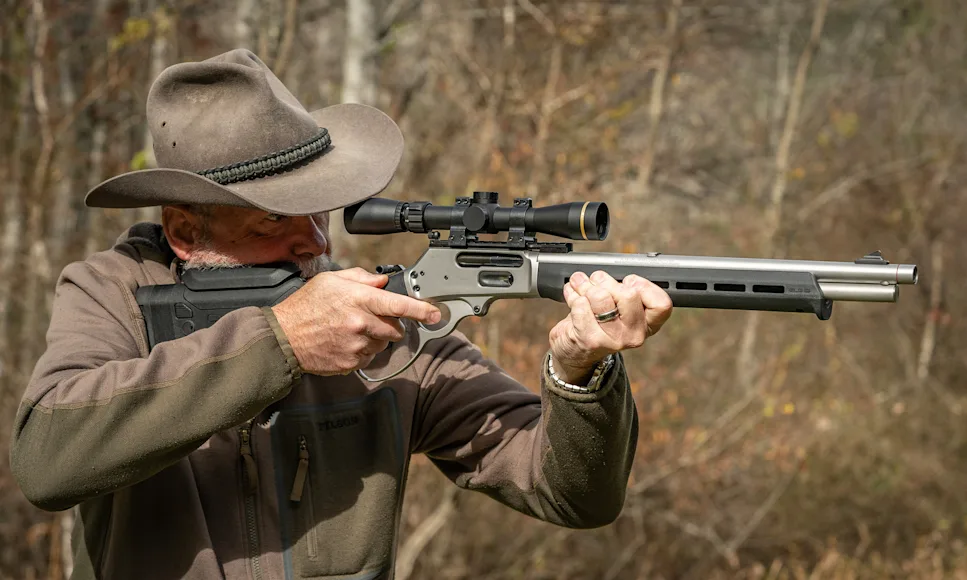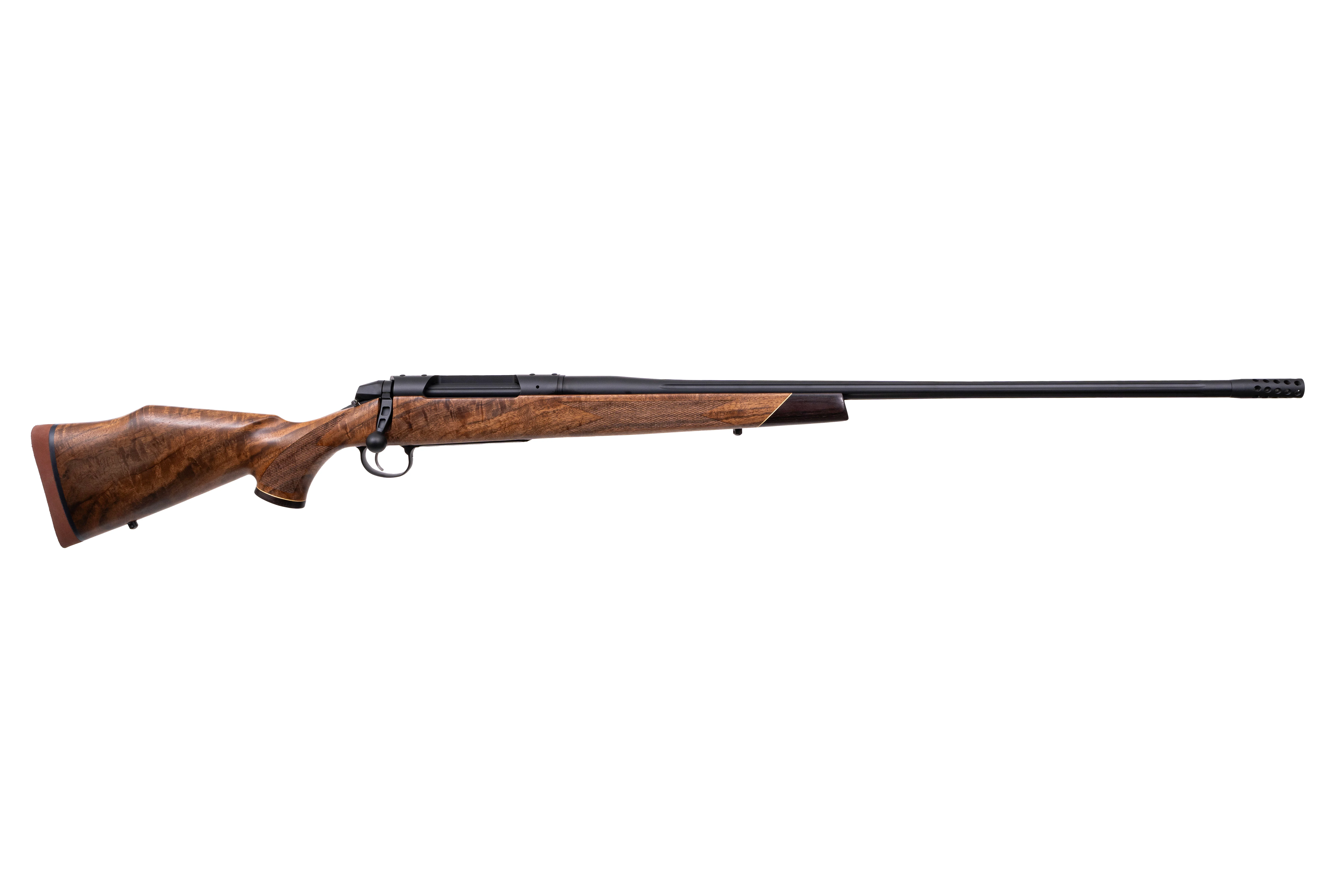We may earn revenue from the products available on this page and participate in affiliate programs. Learn more
Each year, we put the newest and best rifles through their paces, thoroughly testing them and reporting the results, to help you figure out which new rifles are best suited for you. And this year, you have a wealth of great choices. Collectively, the 11 rifles I tested in 2025 are the lightest and best-shooting group of new rifles I've ever evaluated. (I shot more than 175 five-shot groups with them, and the overall average was only 1.10 inches.) There is another trend, though: Inflation is real, and the average rifle price this year was 25% higher than last year. That said, there are some solid values in the mix.
As always, I put every rifle through the wringer, scrutinizing each one's design, features, and performance, with the ultimate goal of providing you a single source for comparing all the hottest options out there. That’s what you will find below: a detailed summary every rifle I tested in the last 12 months, and a link to a comprehensive review of each. And now, with all of that said, here are the best rifles of 2025.
The Best Rifles
Editor’s Choice: Christensen Arms Ridgeline FFT
Best Value: Weatherby Vanguard Black Hills
Best Traditional Rifle: Browning X-Bolt 2 Hunter
Most Innovative: Q The Fix
Most Accurate: Proof Research Glacier Ti
The Best of the Rest
How We Tested and Scored the Rifles
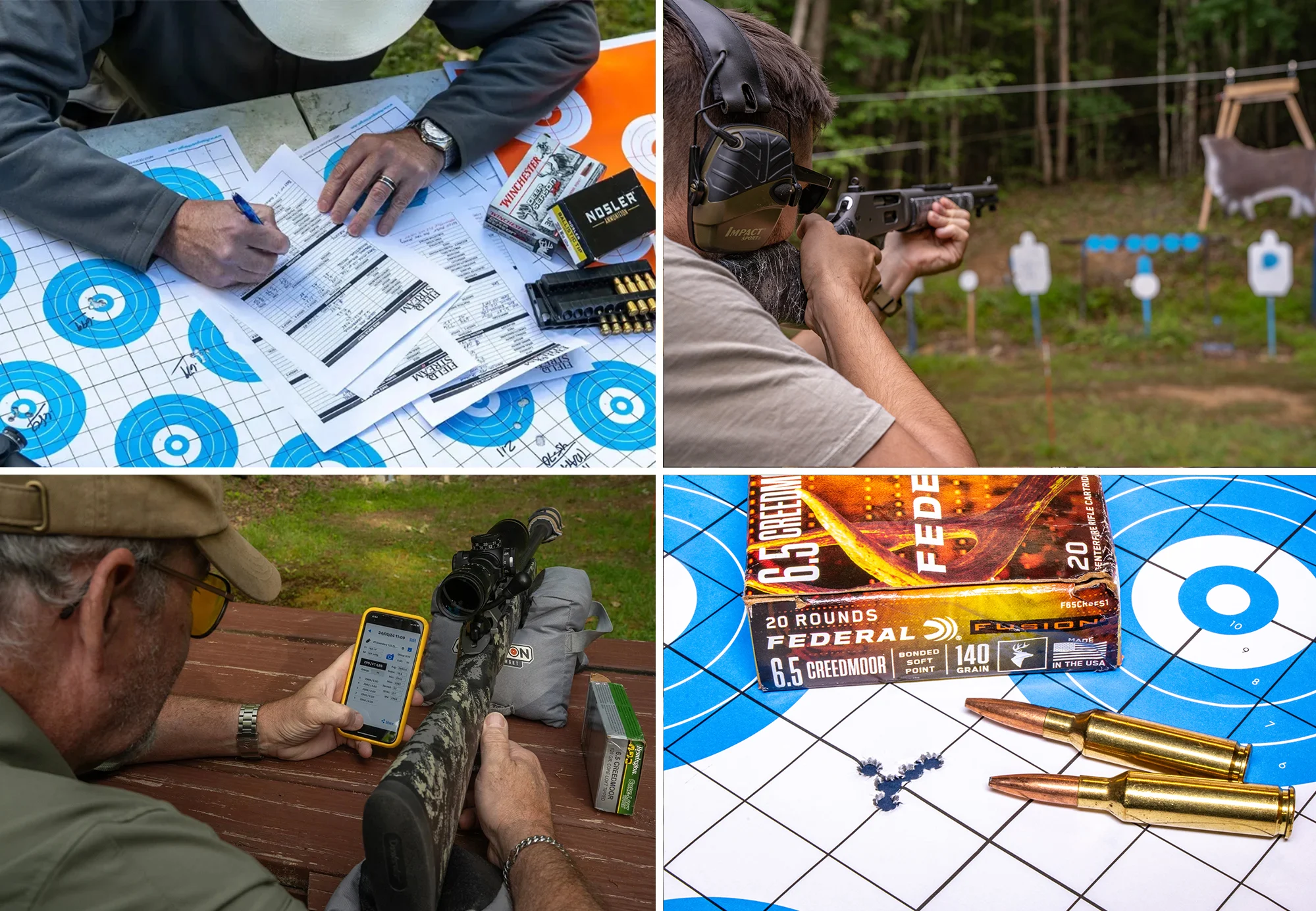
As soon as I receive a new rifle, I familiarize myself with it and then mount a quality riflescope. Next, I fire multiple five-shot groups at 100 yards with a variety of ammunition, chronographing every shot. After that, I subject each rifle to a variety of examinations and shooting drills to establish the rifle’s reliability and field performance, based on its style and how it will likely be used. These drills include rapid fire and shooting from various field positions, from tree stands, shooting houses, and even at a moving deer target. Also, if the rifle has a threaded muzzle, I do some of the shooting with a suppressor. Throughout the process, I appraised each rifle in terms of precision, shooter interface, reliability, workmanship, and cost.
Our Rifle Test Scoring System
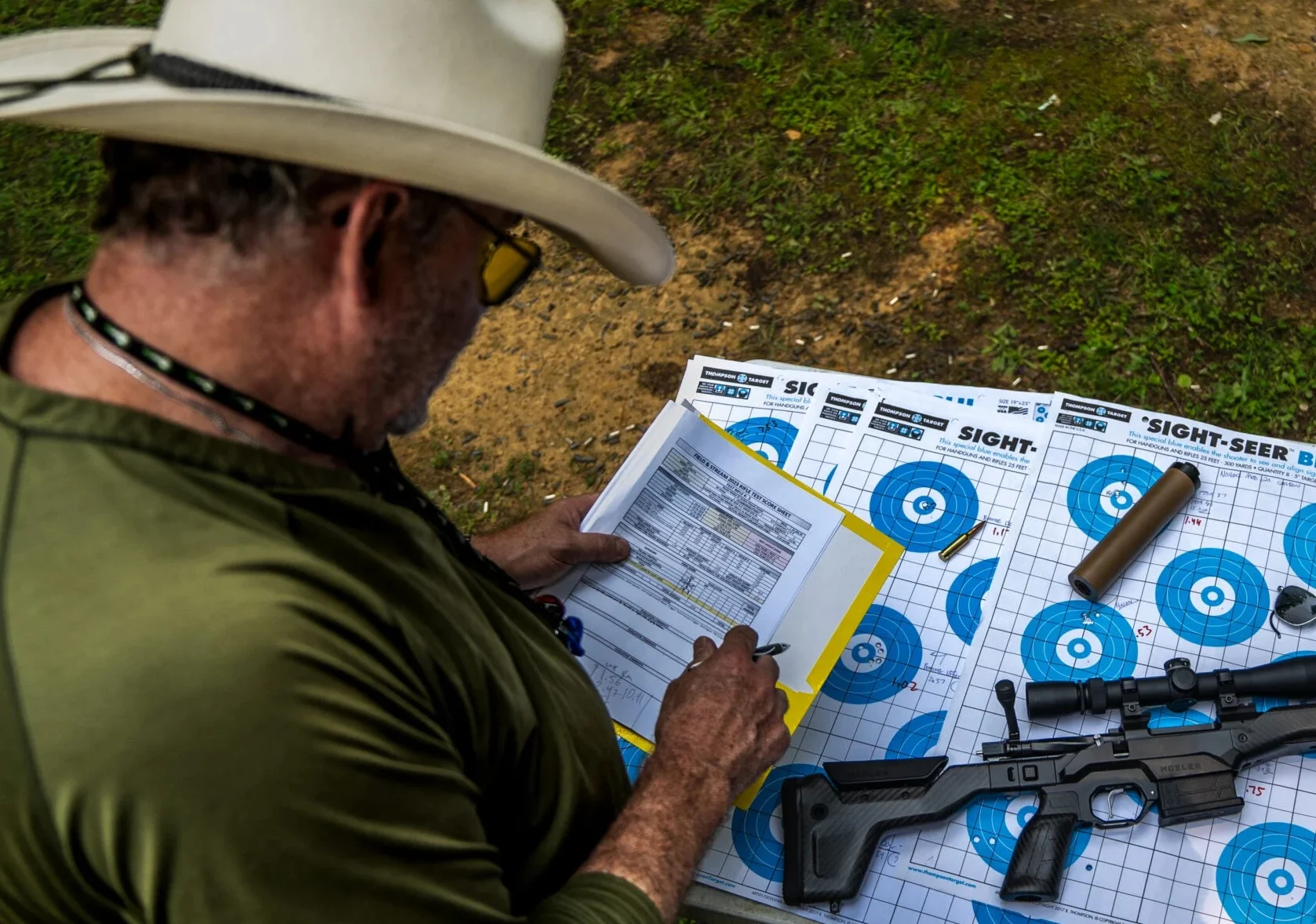
Once I'm satisfied a rifle has been thoroughly analyzed, I score it from 1 to 100 in the test categories below and then take an average for get a final score. Modern hunting rifles are so diverse it’s not practical to compare them head to head. Instead, rifles are scored individually against the ideal. Here's what I'm looking for in each test category:
Precision: Based on multiple five-shot groups fired with a variety of loads at 100 yards, what level of precision can you expect the rifle to deliver?
Interface: Is the stock comfortable, is the trigger easy to interact with, is the action and all controls easy to operate, how much adjustability is in the stock, and was the rifle easy to load, carry, and manage in the field?
Reliability: Did the rifle work? Did it feed reliably, function as intended, and were there any stoppages, failures, or quirks?
Workmanship: I look at stock-to-metal fit, tool marks, and the finish. Did the rifle function smoothly and was its design and innovation practical?
Price: Is the rifle’s suggested price commensurate with its features and performance—do you get your money’s worth?
Each year, I give a tip of the hat to a few standout performers with awards for Best Overall and Best Value, and this year
Best Overall: Christensen Arms Ridgeline FFT
Why It Won Best Overall: With its smooth and flawless operation, sub-6-pound weight, consistent sub-MOA precision, and wide array of chamberings, the Ridgeline FFT offers a lot to the hunter. It's not cheap, per se, but it is a solid value.
Total Score: 93.99
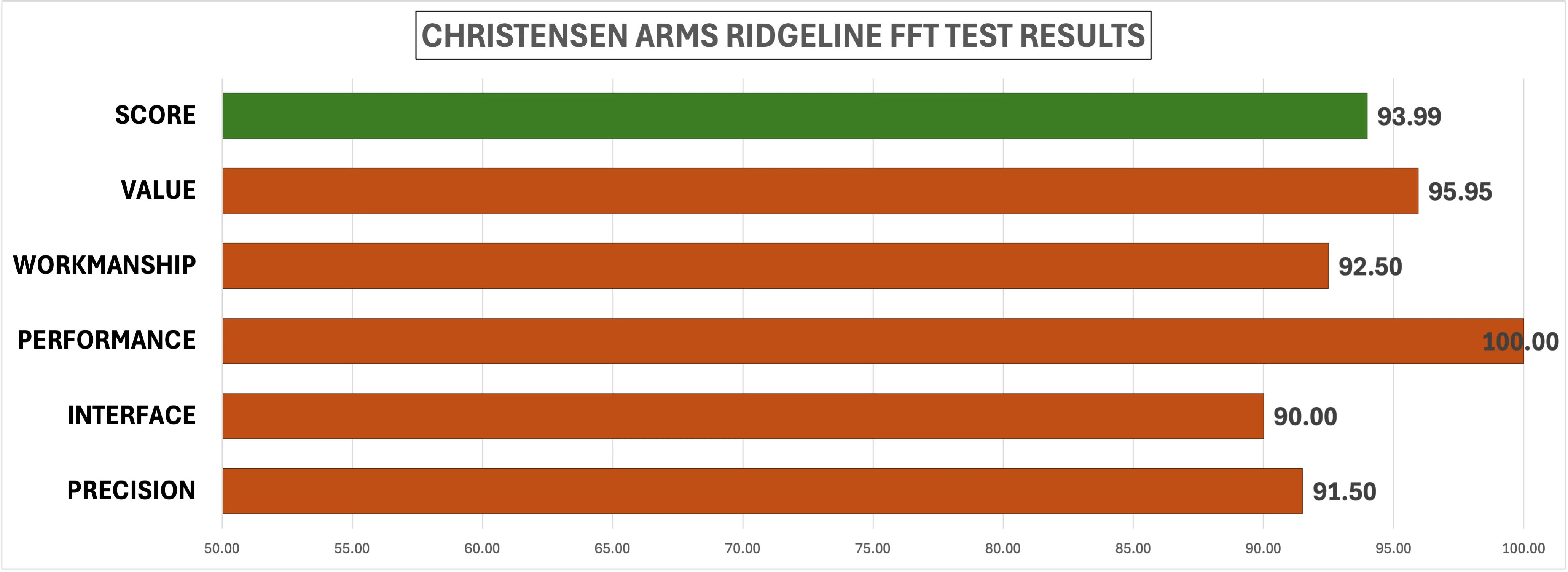

Specs
Length: 38 to 44 inches without muzzle brake and depending on chambering
Weight: 5.45 pounds (as tested)
Barrel: 16 to 24 inches depending on chambering, with threaded muzzle, brake, and thread protector. (20-inch, as tested)
Action: Christensen Arms Model 14, bolt action, two-lug
Trigger: TriggerTech adjustable, 2.25 pounds (as tested)
Capacity: 3+1
Finish: Cerakote
Stock: Christensen Carbon Fiber FFT
Available Chamberings: 22-250 Rem., 243 Win., 6mm Creedmoor, 6.5 Creedmoor, 6.5-284 Norma, 6.5 PRC (tested), 270 Win., 6.8 Western, 7mm-08 Rem., 280 Ackley, 7mm Rem. Mag., 7mm PRC, 28 Nosler, 308 Win., 30-06 Springfield, 300 WSM, 300 Win. Mag., 300 RUM, 300 PRC
Price: $2,049.99
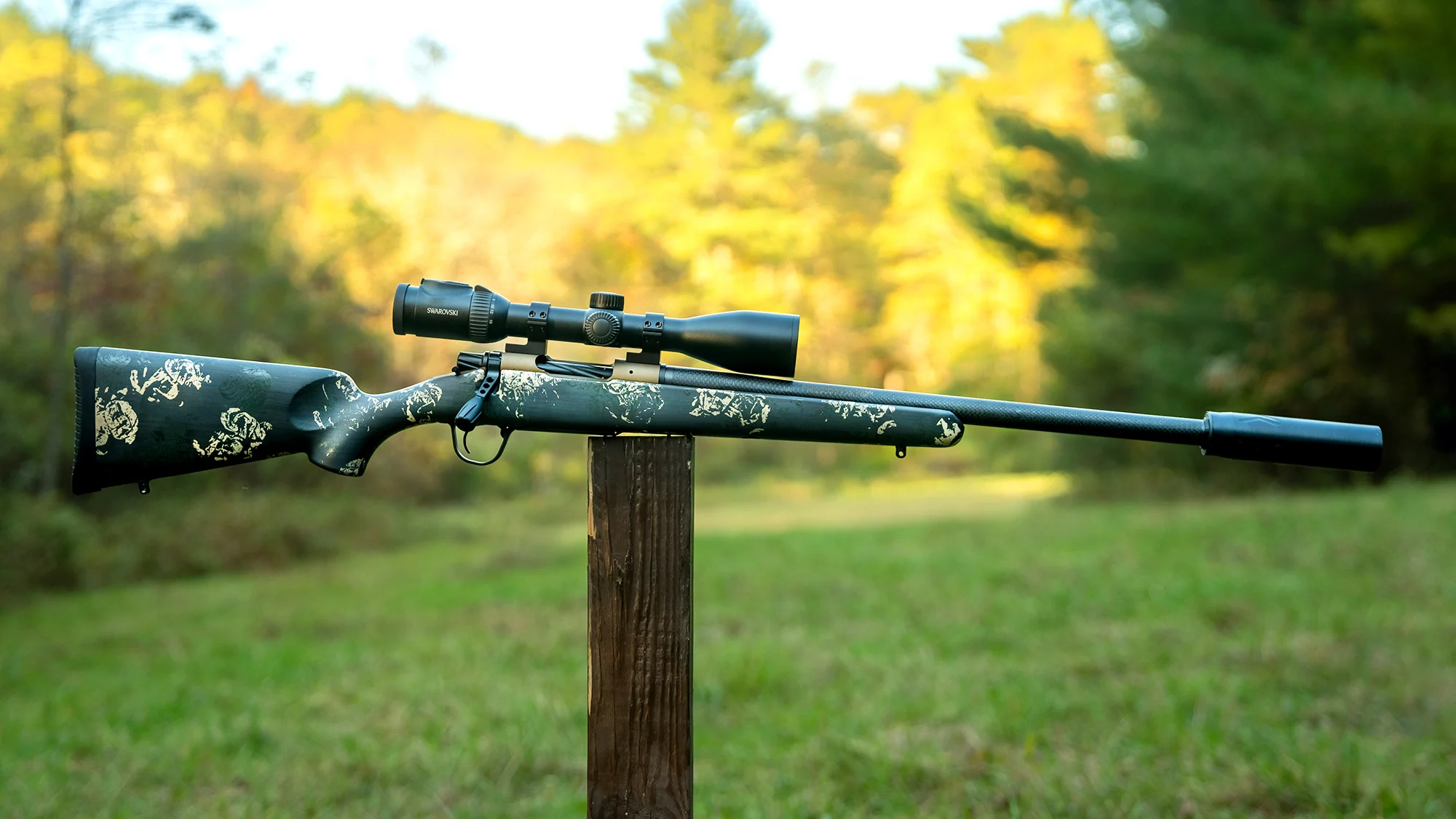
Ridgeline FFT Features and Test Results
Pros
Incredibly lightweight
Great trigger
Outstanding precision
Cons
Safety does not lock bolt
The Ridgeline FFT uses an action similar in design to the famed Remington 700; it has two-lugs, the same footprint, and will accept the same scope mounts. Yet it's different, with a redesigned bolt release, enlarged ejection port, M16-like extractor, dual plunger ejectors, and a spiral fluted bolt that’s butter smooth. The button-rifles barrel is hand lapped and made from 416R stainless and wrapped using a proprietary process with carbon fiber. Barrel lengths ranging from 16 to 24 inches, and the muzzle is threaded. The barreled action is bedded to the Flash Forged Technology (FFT) stock, which weighs less than 20 ounces with the recoil pad attached. Christensen Arms makes these stocks in house with carbon-fiber bedding pillars. Other features include a Burnt Bronze or Black Cerakote on all metal surfaces, a stainless-steel muzzle brake, TriggerTech trigger, and a hinged aluminum floor plate. The rifle also comes with a sub-MOA accuracy guarantee.
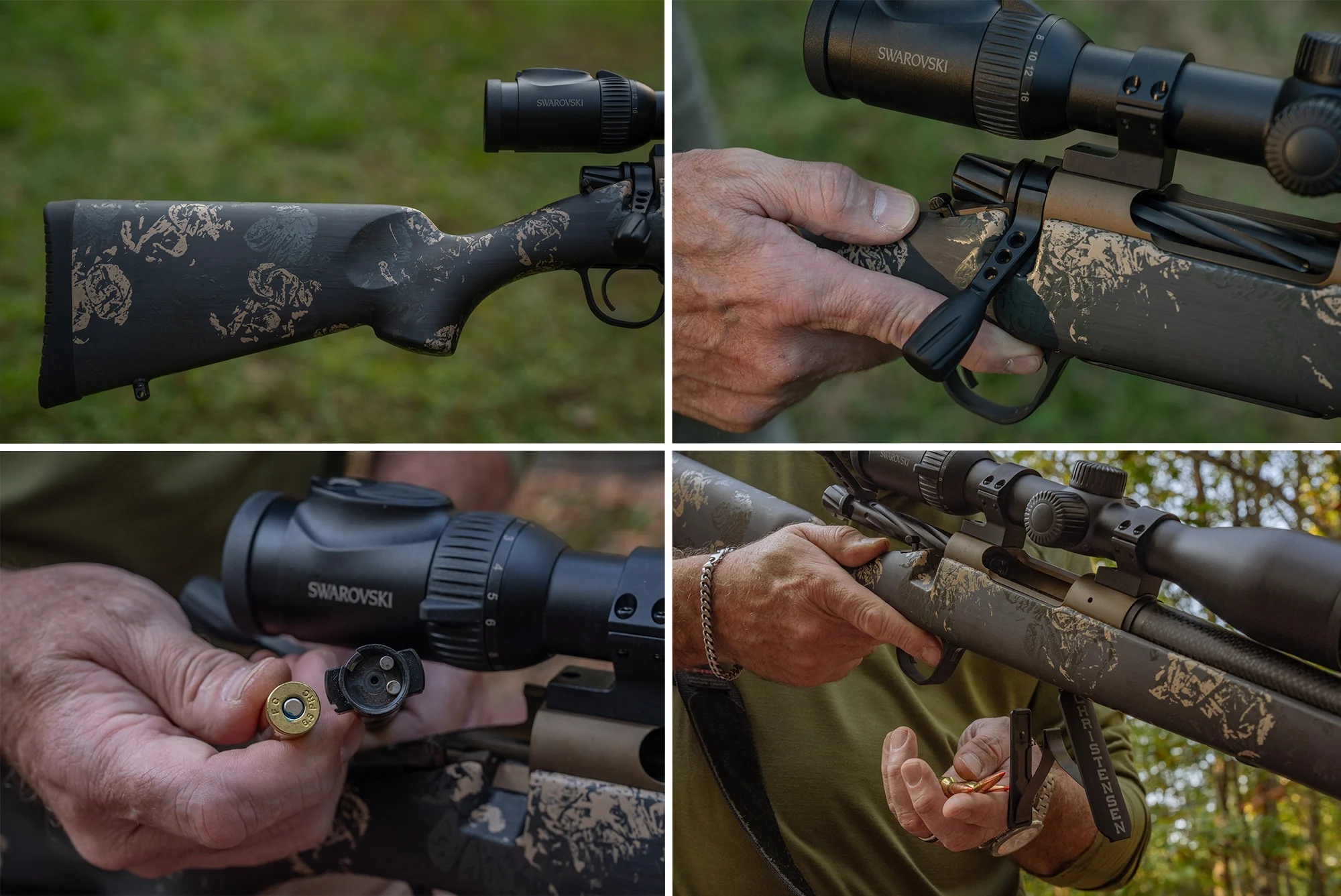
Test Results: Feeding and functioning were flawless, and the rifle’s trigger was very good. The rifle shot fantastically well from the bench, turning in the second-best performance of any rifle tested this year. The rifle also performed very well during off-hand shooting drills out to around 200 yards, partly because of the good interface with the stock and the trigger, but also because the rifle’s balance was nearly ideal. The FFT carbon-fiber stock was also rigid enough to allow the use of a tight shooting sling without interfering with the free-floated barrel. This type of performance from a rifle that weighs less than 5.5 pounds and only costs two grand puts the Ridgeline FFT is a class by itself. With a threaded muzzle and a wide assortment of cartridges to choose from, it’s a rifle a lot of hunters should be happy to own.
Related: Read a full review of the Ridgeline FFT here.
Best Value: Weatherby Vanguard Black Hills
Why It Won Best Value: This rifle is affordable, accurate, and well-outfitted for the modern hunter who wants to stretch the distance and do a lot of suppressed shooting from a bipod or tripod.
Total Score: 93.40
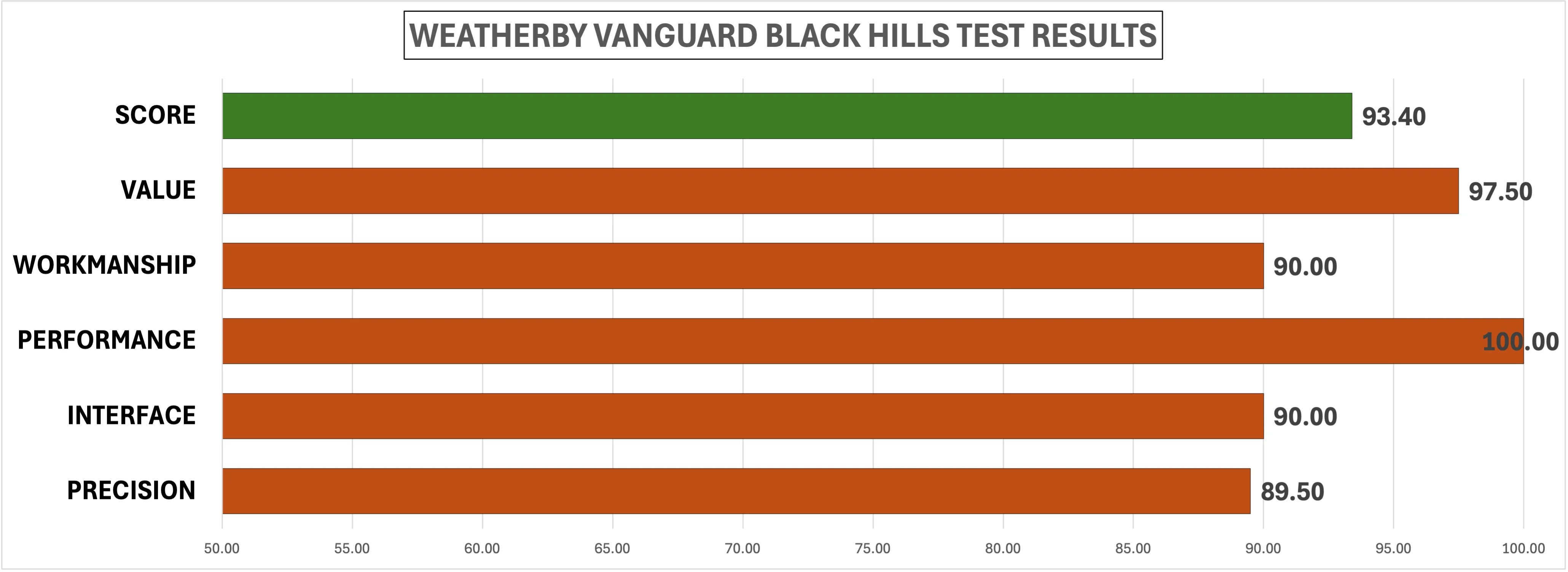

Specs
Length: 40 inches
Weight: 8.19 pounds
Barrel: 20 inches (#3 contour)
Action: Vanguard (bolt action)
Trigger: 3.5 pounds (as tested)
Capacity: 4+1
Finish: Matte blue
Stock: Black Polymer w/ green and brown paint
Available Chamberings: 22-250 Remington, 223 Remington, 243 Winchester, 25-06 Remington, 257 Weatherby Magnum, 6.5 Creedmoor (tested), 6.5 PRC, 6.5-300 Weatherby Magnum, 7mm Remington Magnum, 7mm-08 Remington, 7mm PRC, 30-06 Springfield, 300 Weatherby Magnum, 300 Winchester Magnum, 308 Winchester, 350 Legend
Price: $769
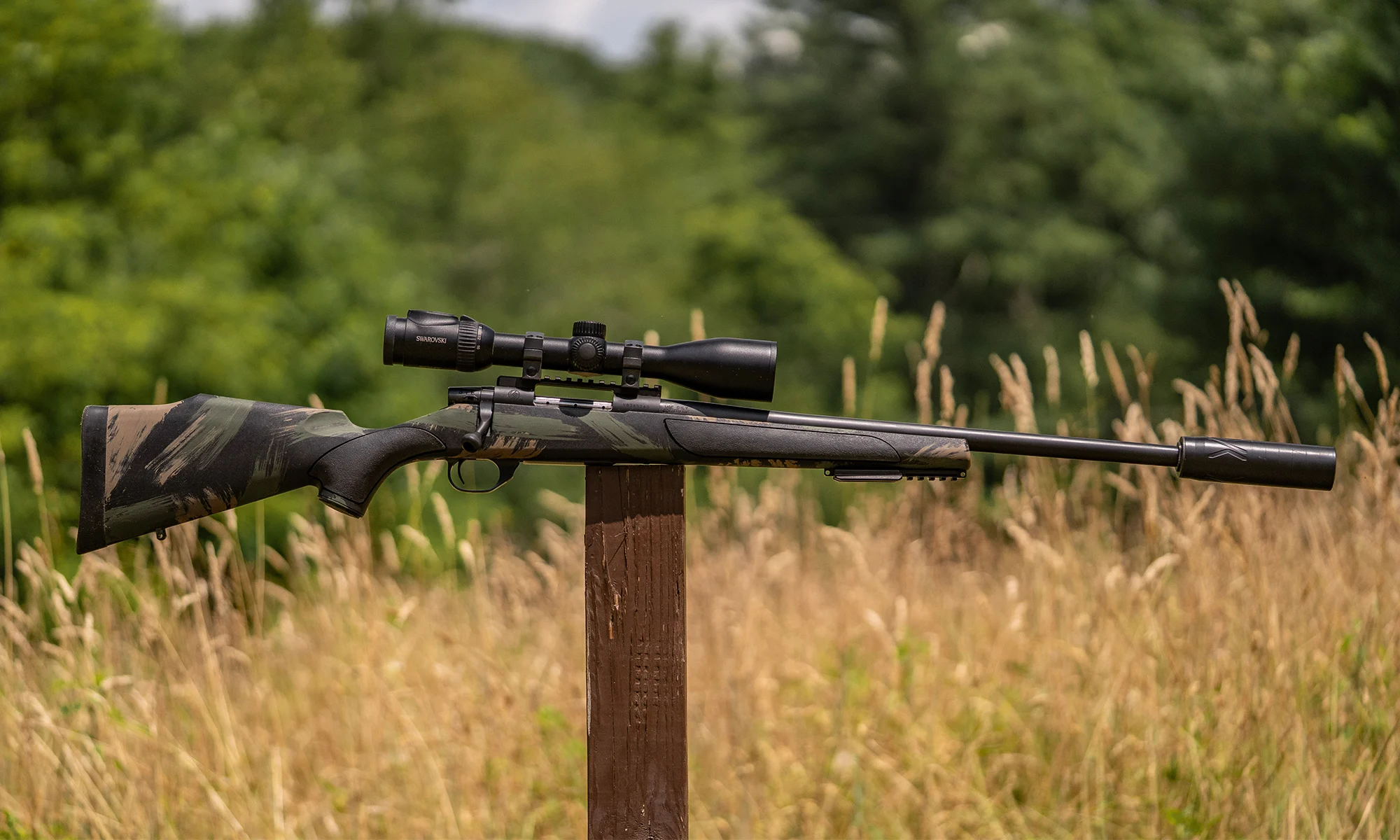
Vanguard Black Hills Features and Test Relults
Pros
Affordable
Bipod/Tripod compatibility
Lots of chamberings to choose from
Cons
On the heavy side
Like all Weatherby Vanguard rifles, the Black Hills uses a Howa barreled action. This is a two-lug, push-feed action with a Sako-style extractor and plunger ejector. The barrel is cold hammer forged, and depending on the chambering, it varies from 22 inches to 28 inches long. The standard contour is a #2, but an option for a heavier #3-contour barrel is available in several chamberings, and a sub-MOA guarantee comes with every rifle. Weatherby’s Accubrake muzzle brake, a two-stage match-grade trigger, and a three-position safety that locks the bolt are all also standard. The Black Hills Vanguard has a black polymer stock with a Monte Carlo comb and a hinged floorplate. The stock is hand painted with tan a green accents. The rifle’s major distinguishing feature is a PEAK 44 ARCA/Picatinny rail for bipod/tripod interface. This underbelly rail includes a sling swivel mount at the front and rear.
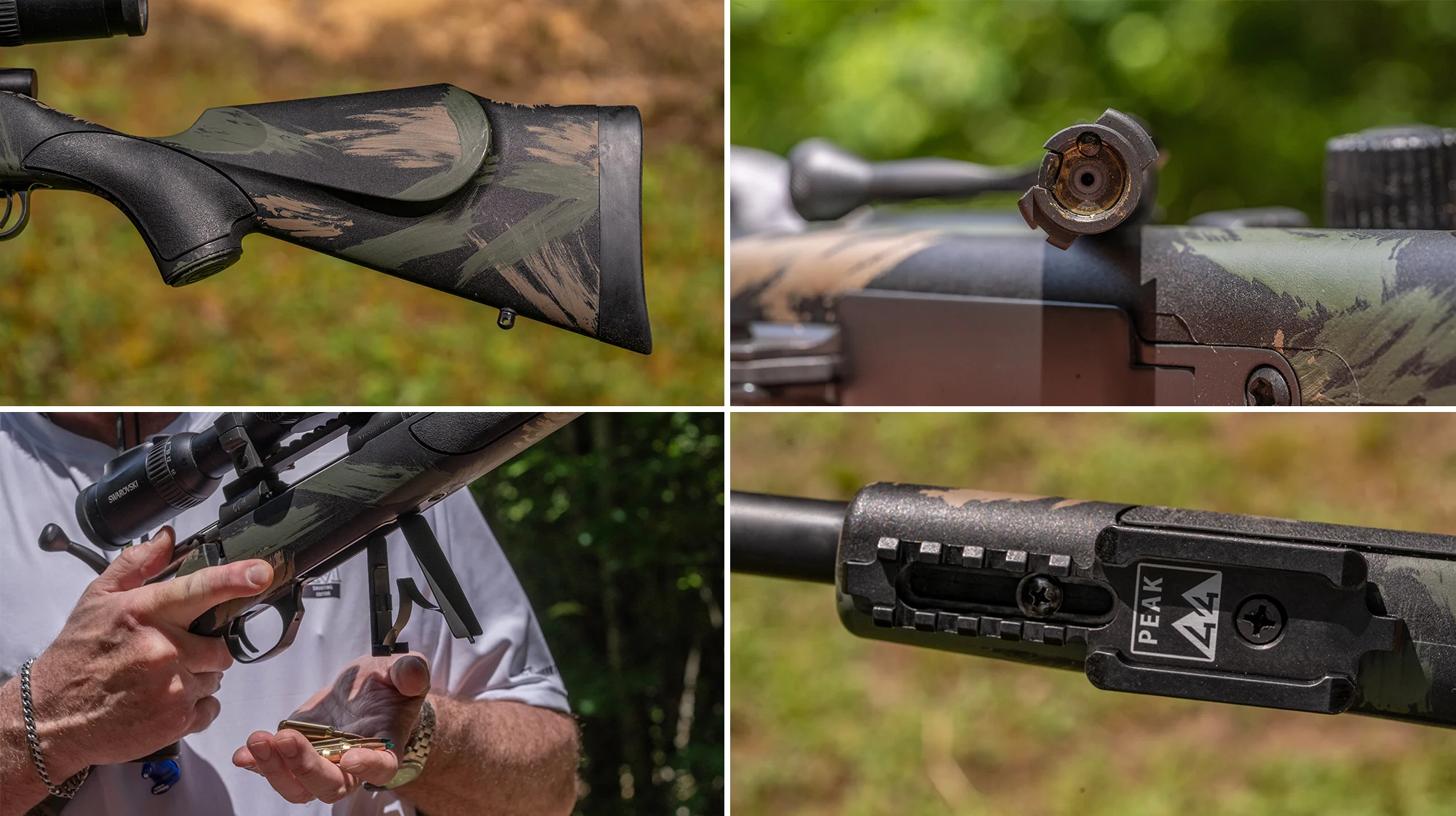
Test Resultls: This rifle was a tack-driver with the new 140-grain Tipped GameKing load in the Barnes Harvest Collection. With the PEAK 44 ARCA/Picatinny rail, the rifle also interfaced well with—and shot well from—the bipods and tripods I tried. Weatherby deserves credit for including the varied barrel contour options with several cartridges, because some hunters prefer a heavier barrel. Weight is the biggest negative with the Vanguard Black Hills, as even with a #2 contour barrel, the rifle will tip the scales at about 7.5 pounds. However, many modern hunters want the added weight to help steady a rifle for long-range shots, and the rifle’s bipod/tripod interface feature makes the Black Hills a natural for this type shooting. If that’s the kind of hunter you are, and the kind of shooting you like, there’s a whole lot of rifle here for the price, which is why the Vanguard Black Hills get our Best Value award.
Related: Real a full review of the Vanguard Black Hills here.
Best Traditional Rifle: Browning X-Bolt 2 Hunter
Why It Won Best Traditional Rifle: This is a reasonably handy, good-shooting, traditionally-styled, wood stocked rifle, with a rock-solid scope mounting system and a safety that locks the bolt.
Total Score: 93.93
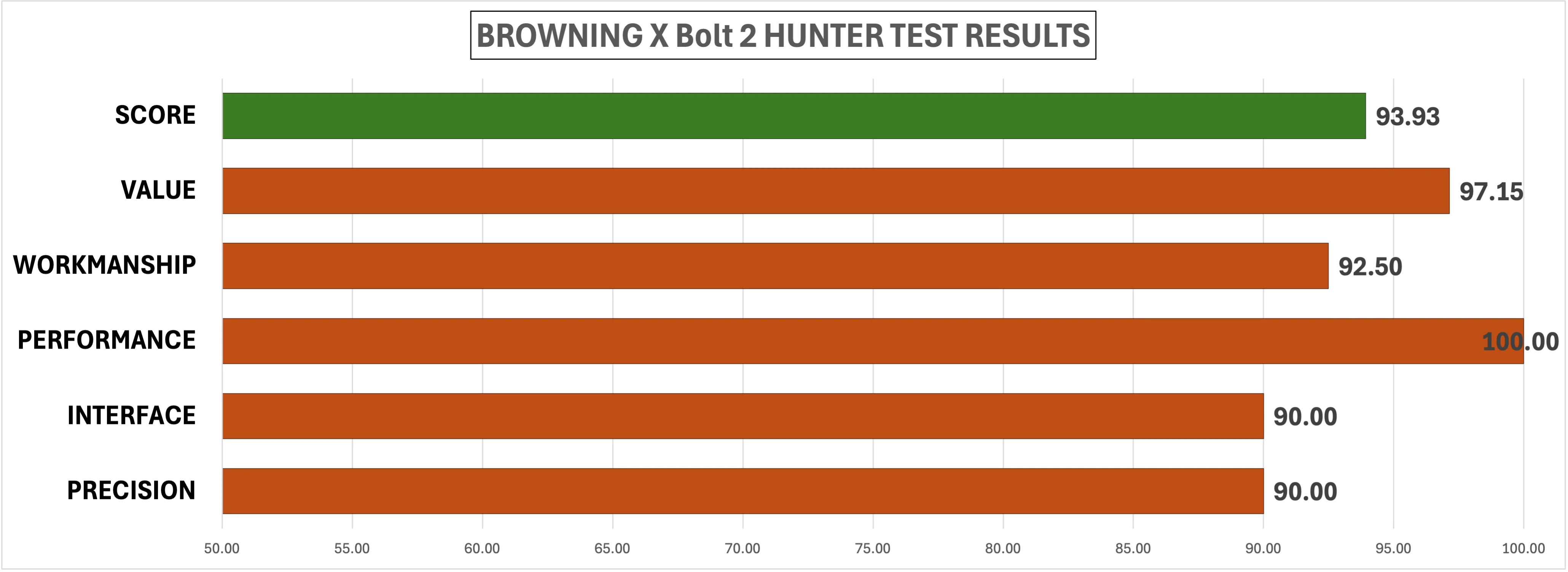

Specs
Length: 42 inches
Weight: 6.625 pounds
Barrel: 22 inches
Action: X Bolt 2 (bolt action)
Trigger: DLX Trigger 3.0 pounds (as tested)
Capacity: 4+1
Finish: Matte blue
Stock: Grade 1 walnut
Available Chamberings: 243 Winchester, 6.5 Creedmoor (tested), 6.5 PRC, 270 Winchester, 6.8 Western, 7mm Remington Magnum, 308 Winchester, 30-06 Springfield, 300 Winchester Magnum
Price: $1,249.99
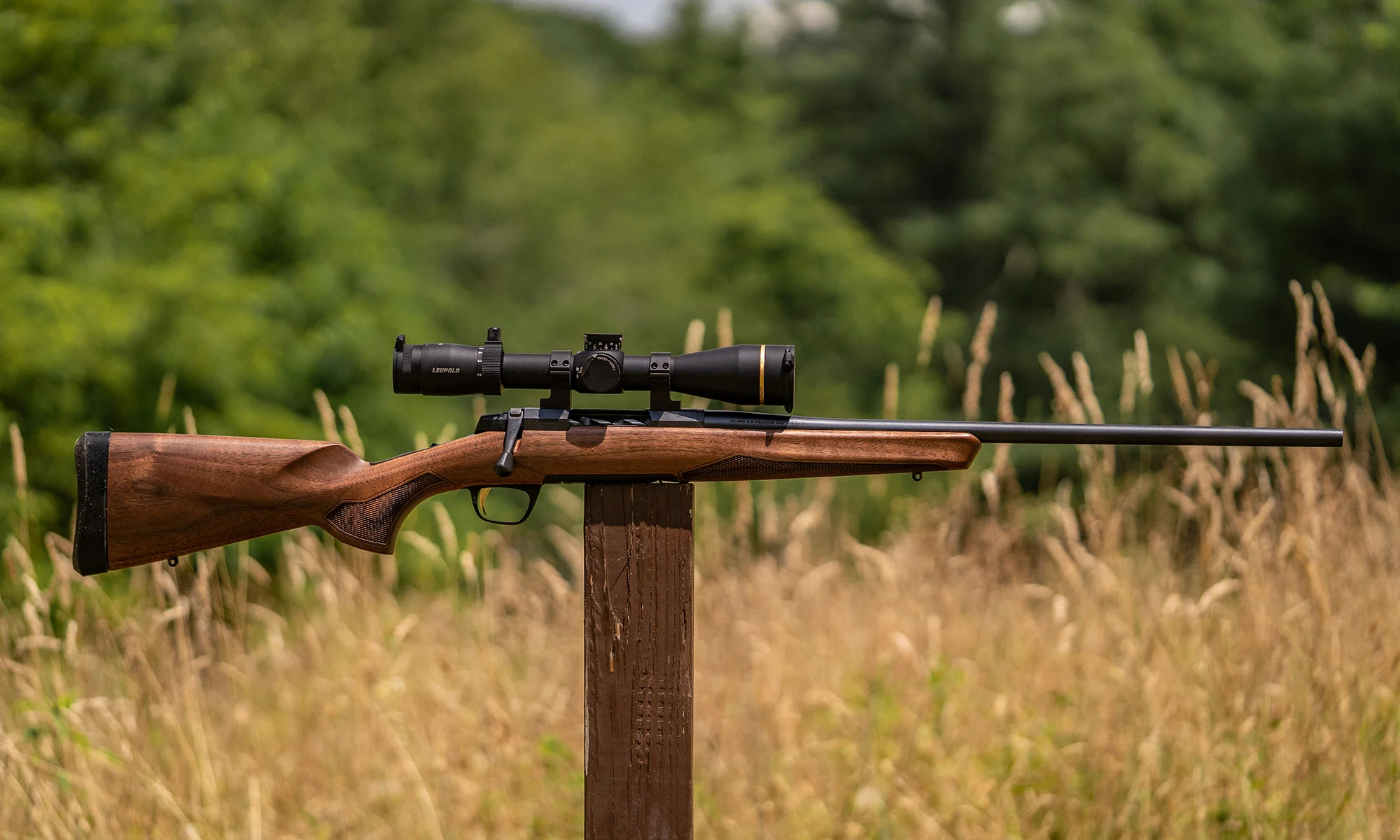
X-Bolt 2 Hunter Features and Test Results
Pros
Traditional Styling
Fantastic Trigger
Great, flush-fitting magazine
Practical bolt un-lock button
Cons
Muzzle not threaded
This classic-looking bolt-action rifle is fairly lightweight and available chambered for a dozen popular cartridges. It uses a push-feed action with a 60° bolt throw, and the fluted bolt has three lugs, a Sako-style extractor, and plunger ejector. It also has a two-position tang safety that will lock the bolt when placed on safe. However, the X-Bolt 2 Huter also has a distinctive bolt-release button on the bolt handle. When the rifle is on safe, you can push this button and operate the bolt. The gun is also equipped with Browning’s new and adjustable DLX trigger, which is one of the best I’ve pulled. The nicely figured walnut stock is checkered at the wrist and forend, and the flush-fitting detachable magazine is one of the best performing currently offered. Scope mounts for most bolt-actions attach with two screws, but the X-Bolt 2 uses a proprietary four-screw per mount system.
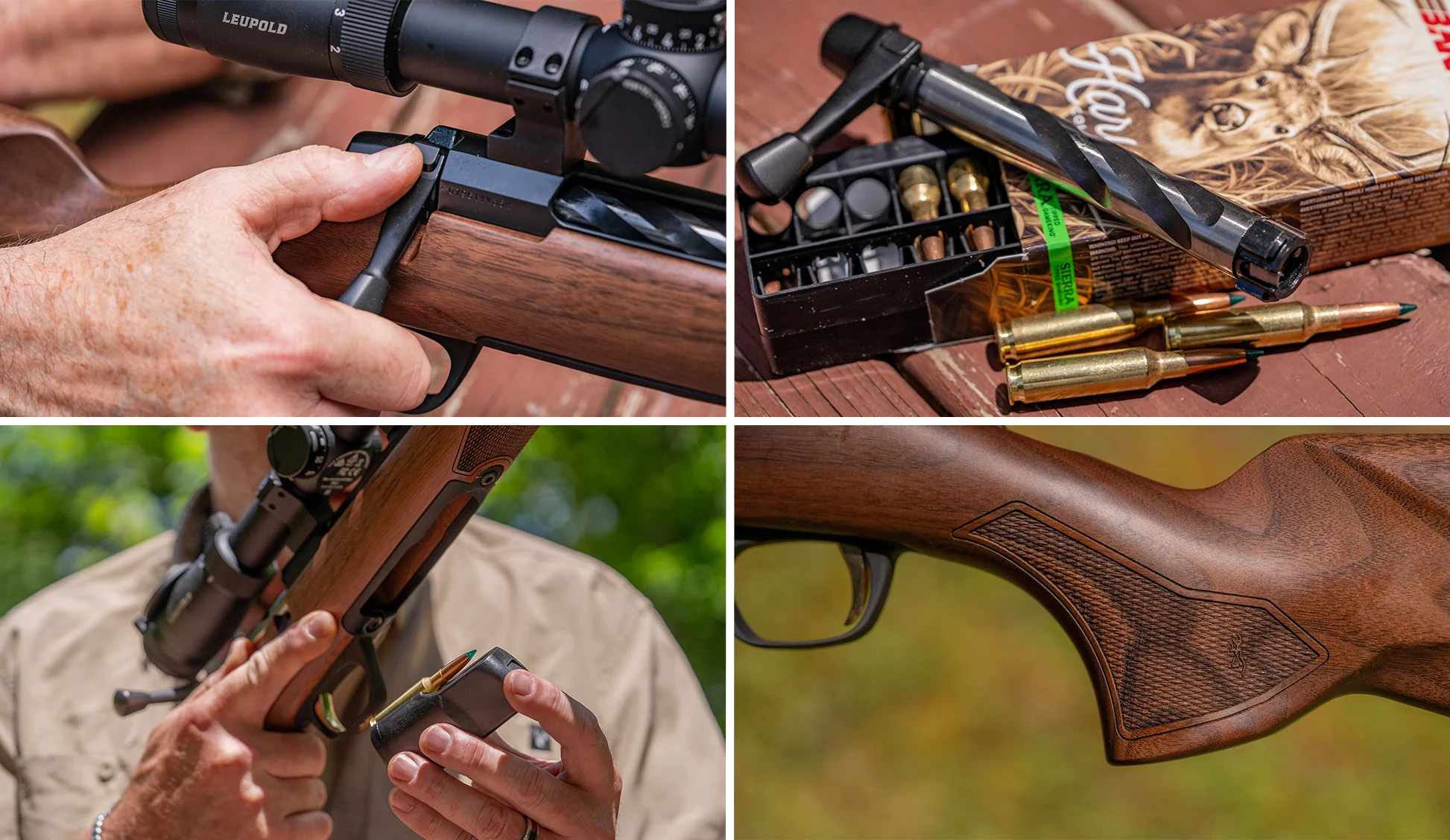
Test Results: Many hunters still prefer a traditionally styled wood-stocked rifle with blued steel, and that’s exactly what this rifle is. The X-Bolt 2 Hunter will do everything most every hunters need done, and it will look damned good doing it. The Hunter is far from the most expensive X-Bolt 2 rifle Browning offers, but it stands as evidence that a rifle does not have to be expensive or weigh 8 pounds to deliver good precision. Our test gun shot quite well. My only complaint with the rifle was that Browning did not thread the muzzle. Granted, that’s not a traditional treatment, but with suppressors becoming so popular with hunters , Browning missed an opportunity. If this rifle would have had a threaded muzzle, it would have given the Christensen Arms rifle a run for its money for the Best Overall award.
Related: Read a full review of the Browning X-Bolt 2 Hunter here.
Most Innovative: Q The Fix
Why It Won Most Innovative Rifle: With its AR15-like modularity, compactness, and barrel-swap capabilities, this rifle is one of the most uniquely and brilliantly designed rifles we’ve seen in years. It's also incredibly versatile.
Total Score: 93.93
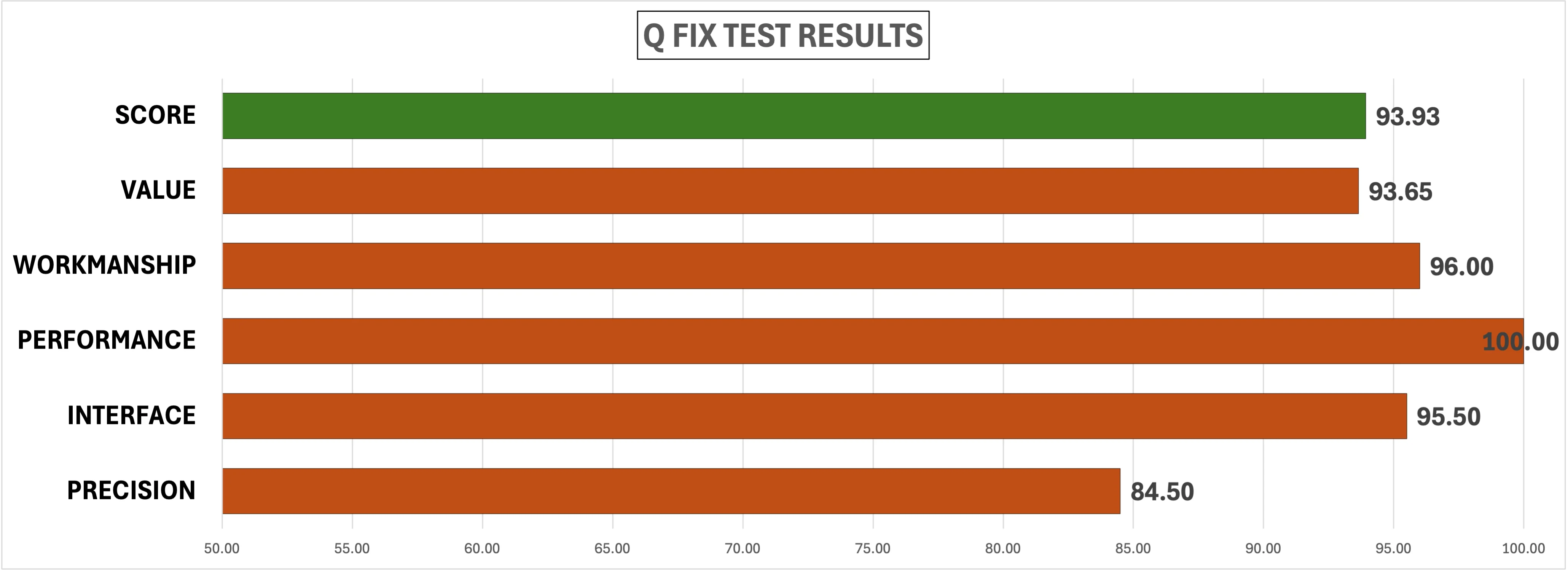

Specs
Length: 34.25 to 36.25
Weight: 5 pounds, 12 ounces
Barrel: 8-inch, 12-inch, 16-inch (tested), 17-inch, stainless steel, threaded 5/8x24
Action: Striker-fired, bolt action with 45° throw
Trigger: Two-stage match, 2.5 pounds (as tested)
Capacity: Detachable SR-25-type magazine, ships with 10-round Magpul P-Mag
Finish: Combination hard anodizing and nitride
Stock: Skeletonized, folding adjustable buttstock, aluminum Q-Sert handguard
Available Chamberings: Switch-barrel, 6.5 Creedmoor, 308 Winchester (tested), 8.6 Blackout
Price: $3,475
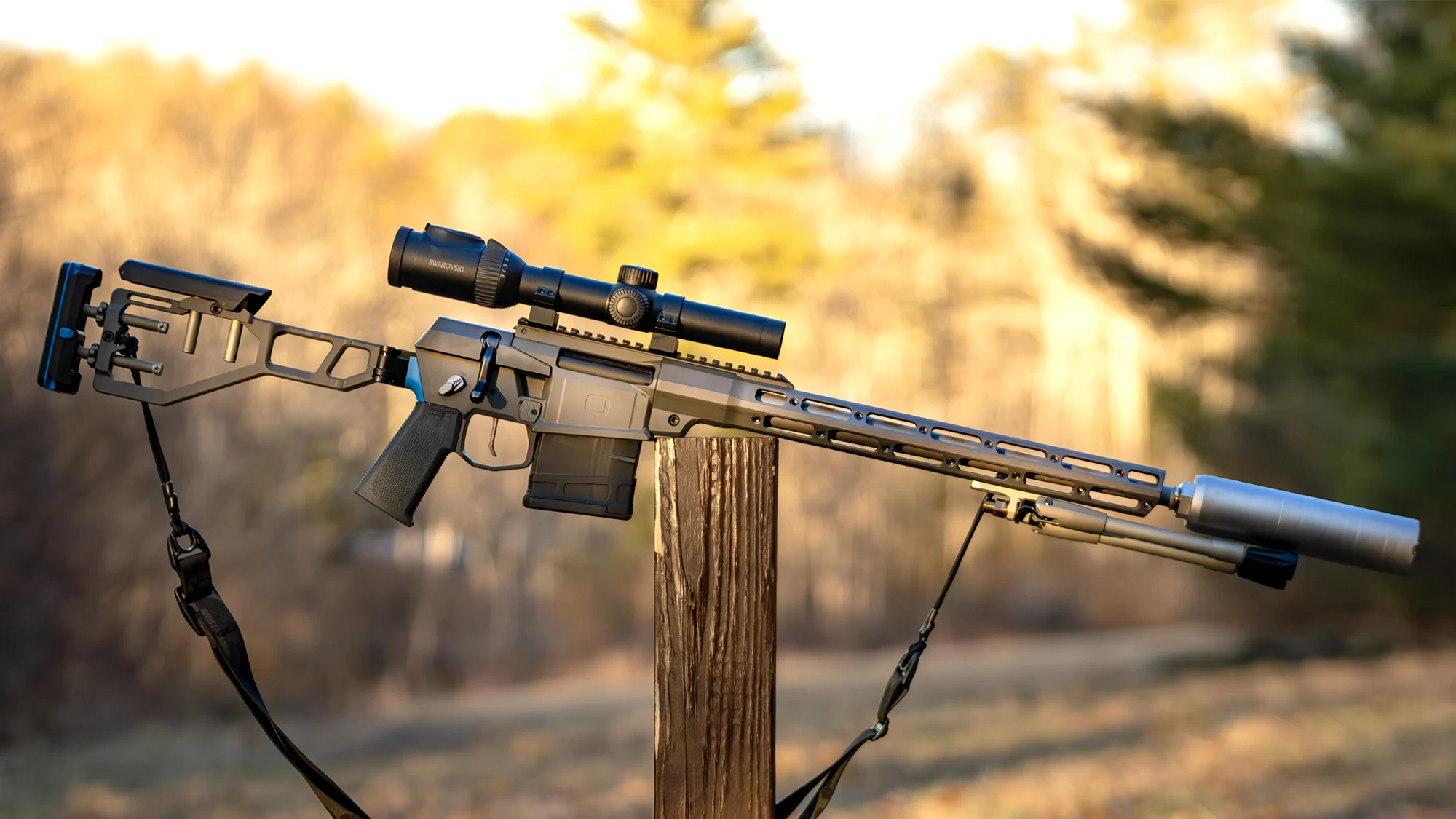
Q The Fix Features and Test Results
Pros
Light
Versatile
Accurate
Cons
Safety does not lock bolt
Expensive
The Fix is not a new rifle, but many shooters and hunters are unfamiliar with it. Q builds the Fix on a one-piece 6061 aluminum receiver, and it feeds from AR10 magazines. The trigger is very simple and breaks clean and crisp at 2.5 pounds. The rifle has an ambidextrous safety, like an AR15, and accepts AR15 grips. The way Q designed the receiver to work with a barrel extension, you can swap cartridges/barrels on your own in a matter of minutes.
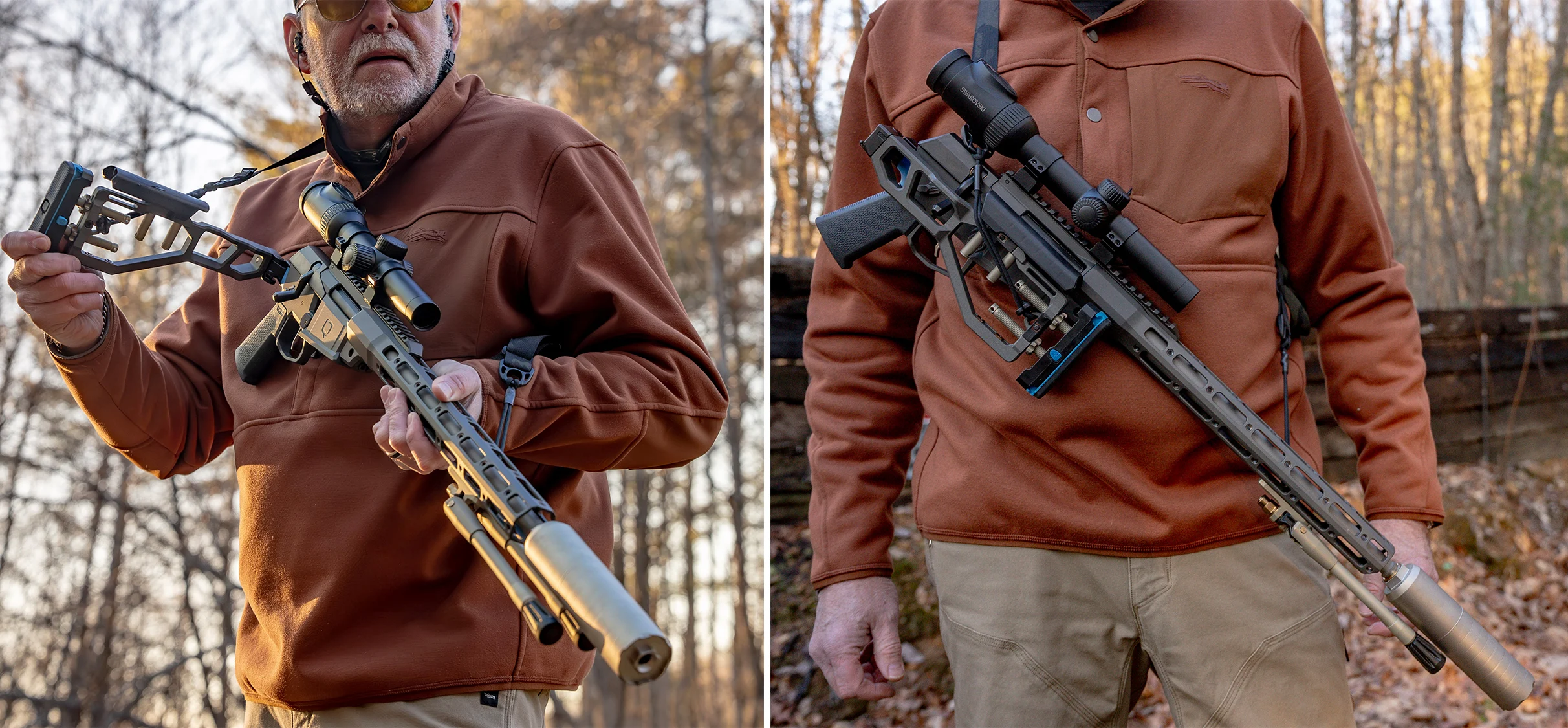
The stock is fully adjustable and folds out of the way, capturing the bolt. The action uses a unique four-lug bolt with a 45° lift and a striker-firing system. It also comes with a Picatinny scope rail and an aluminum forend that uses Q’s proprietary accessory attachment system. All Fix barrels are threaded and designed to work with Q’s tapered muzzle device to interface with a Q suppressor. The Fix is also available with barrels as short as 8 inches, so you can run a suppressor and still have a very compact rifle. (This makes the rifle an SBR, but after January 1, 2026 there is no $200 tax on SBRs.)
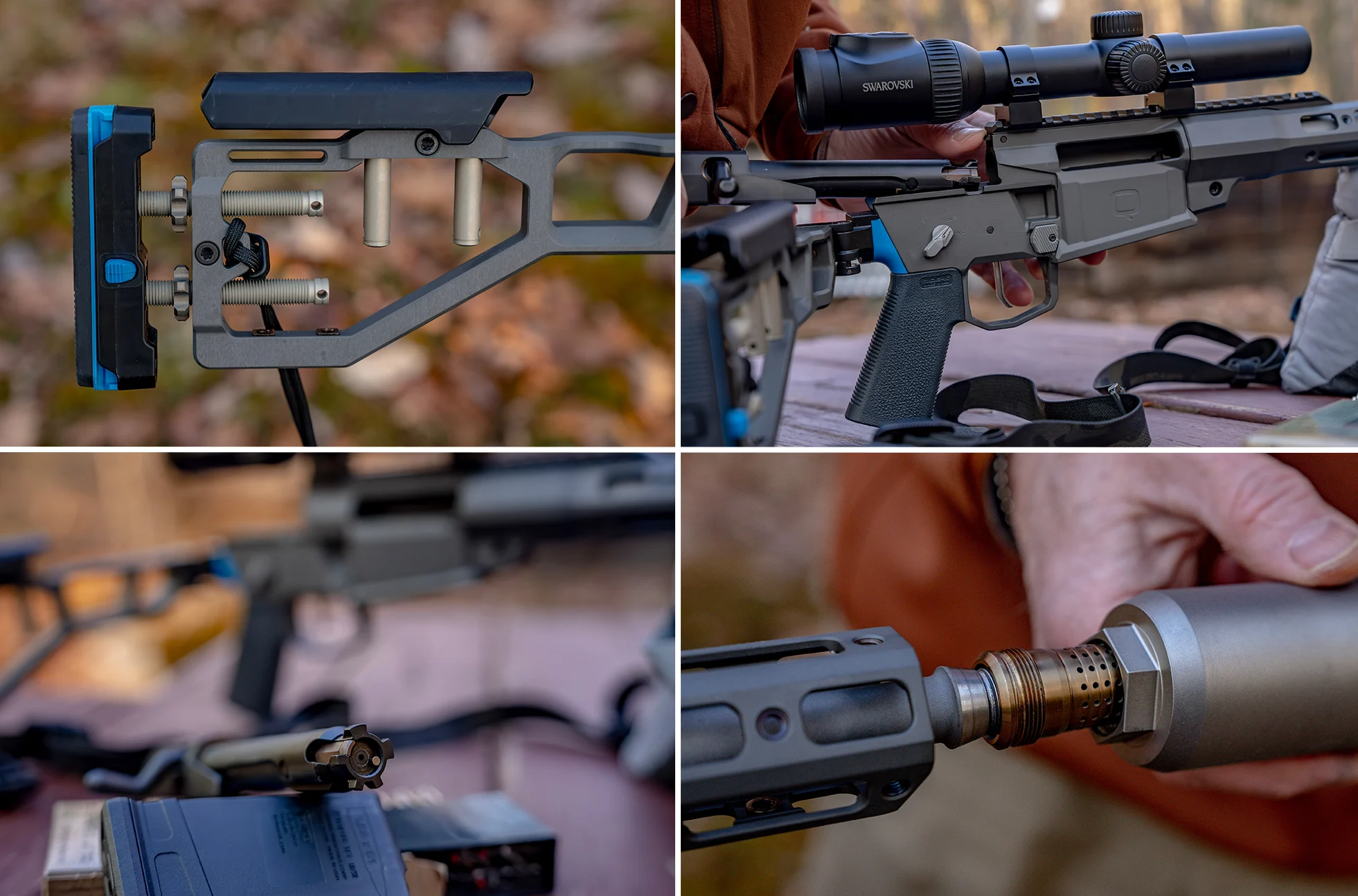
The Fix delivered consistent precision and never fired a five-shot group larger than 1.5 inches. Modern military veterans and anyone familiar with the AR15 will find the grip, feel, and ambidextrous safety operation natural. The rifle really excelled when shooting from field positions. The knob-less bolt handle took some getting used to, but it was smooth and easy to operate. To some extent, the Fix is a system-rifle, meaning for optimum performance you should pair it with other Q accessories like one of their Trash Panda suppressors, their rugged but light Kickstand bipod, their very practical 2.0 ounce G-sling, and additional barrels of different lengths in one or all three cartridges they offer. Overall, the rifle performed well without exception and is one of the most unique bolt-action rifles I’ve tested. It’s extremely versatile and adaptable and was purpose built for use by practical hunters at practical ranges.
Related: Read a full review of the Q Fix rifle here.
Most Accurate: Proof Research Glacier Ti
Why It Won Most Accurate: It wasn’t even close. Not only is this rifle a tack-driver, but it also only weighed a shade over 5.5 pounds as tested and functioned superbly.
Total Score: 93.93
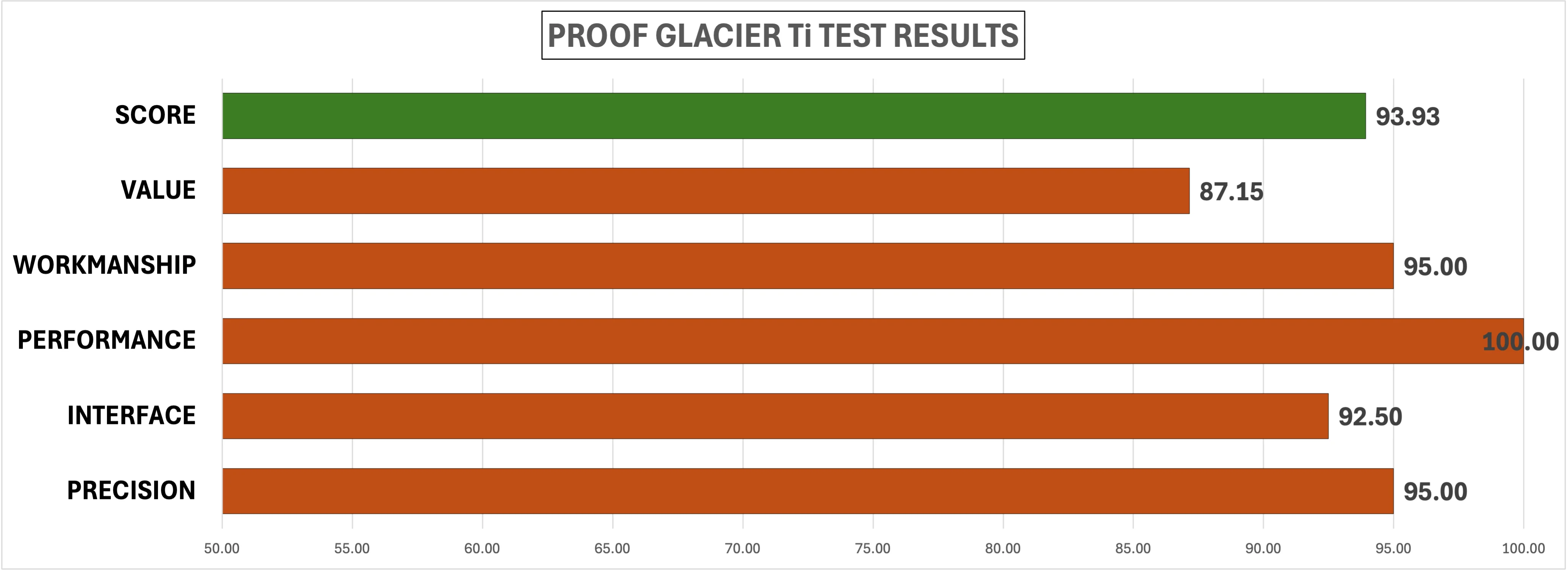

Specs
Length: 39.75 to 45.75
Weight: 5.31 to 6.25 pounds (5.62 pounds as tested)
Barrel: Proof patented Carbon Fiber Wrapped match-grade (20 to 26 inches)
Action: Right or Left-Hand, Long Peak titanium, two-lug action
Trigger: User adjustable Trigger Tech trigger (2.0-pounds as tested)
Capacity: 4+1
Finish: Cerakote
Stock: Proof Research carbon fiber Lightweight Mountain Hunter Stock
Available Chamberings: 25 Creedmoor (tested), 6.5 Creedmoor, 6.5 PRC, 7mm PRC, 308 Winchester, 300 Winchester Magnum
Price: $7,499
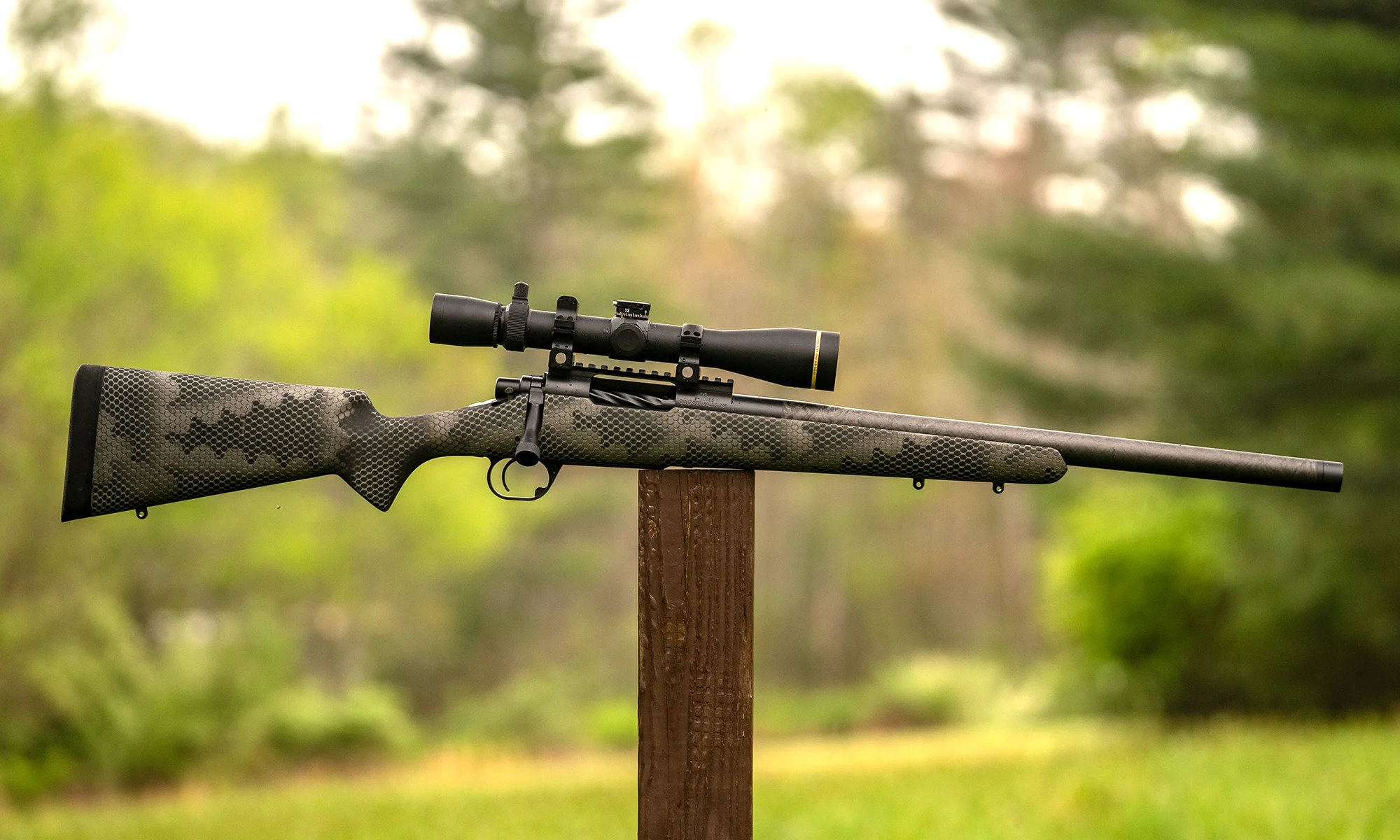
Glacier Ti Features and Test Results
Pros
Incredible precision
Excellent workmanship
Light and Compact
Cons
Hellaciously expensive
Safety does not lock bolt
Proof builds this rifle on a Long Peak Razor Ti two-lug action that emulates the push-feed Remington 700 action. But there are differences. It has a spiral-fluted bolt and an M16/Sako-style extractor, and comes with a match grade, Proof carbon-fiber wrapped barrel. The “Ti” in the name means the action is titanium, and it is exquisitely bedded into Proof’s Lightweight Mountain Hunter carbon-fiber stock. It feeds from an internal magazine and the release for the hinged floor plate is inside the trigger guard. This is a full custom rifle. You can choose the chambering, barrel length, length of pull, stock and metal color, and whether or not you want the barrel threaded. It also comes with a sub ½ MOA three-shot precision guarantee and a test target.

Test Results: Because I only had one factory load for the 25 Creedmoor, I had to also handload for this rifle. But I did not work up handloads specifically for the rifle; I just threw five loads together and the rifle still averaged 0.83-inch from the bench after firing more than 18 five-shot groups. Yet, this is not a bench rest rifle, by any stretch. It’s a hunting rifle weighing it at only 5.62 pounds. Even with its 20-inch barrel, it was slightly muzzle heavy, which is ideal for field shooting. The adjustable Trigger Tech trigger was fantastic and broke at 2.0 pounds, fit and finish were excellent, and the rifle performed without a hitch. My only complaints were that the safety does not lock the bolt, and the rifle is as expensive as a trophy mule deer hunt in Colorado. This is one of the best-looking, feeling, handling, and performing rifles I’ve ever worked with, but I cannot afford it, and you probably can't either. But if you can, I'd say go for it.
Related: Read a full review of the Glacier Ti here.
Weatherby 307 Adventure SD
Total Score: 92.96
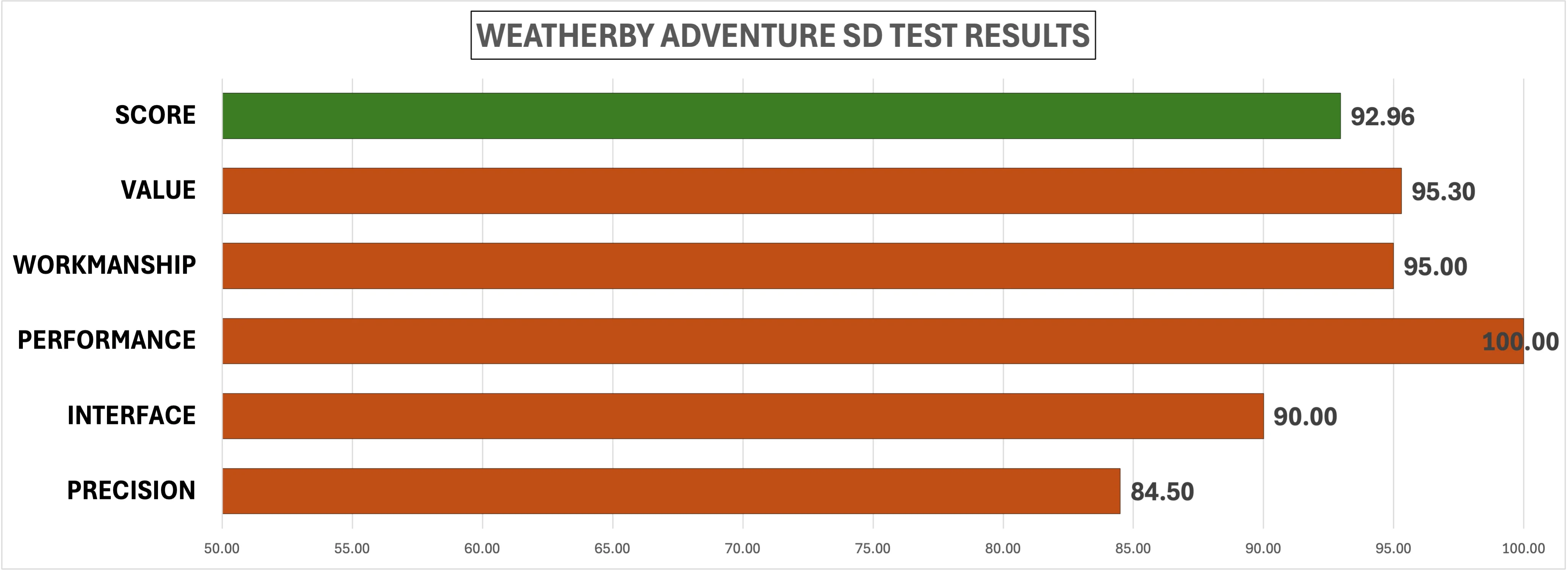

Specs
Length: 44.25 inches (including two-inch muzzle brake)
Weight: 7.7 pounds
Barrel: 26 inches + 2 inches with muzzle brake
Action: Weatherby 307
Trigger: Trigger Tech Field Trigger
Capacity: 3+1 (6.5-300 Weatherby Magnum)
Finish: Graphite black Cerakote
Stock: Fancy walnut with rosewood forend, grip cap, and maple diamond inlay.
Available Chamberings: 240 Weatherby Magnum, 243 Winchester, 257 Weatherby Magnum, 6.5 Creedmoor, 6.5 PRC, 270 Winchester, 270 Weatherby Magnum, 6.5-300 Weatherby Magnum (tested), 6.5 Weatherby RPM, 270 Winchester, 7mm Backcountry, 7mm PRC, 30-30 Springfield, 300 Weatherby Magnum
Price: $1,949
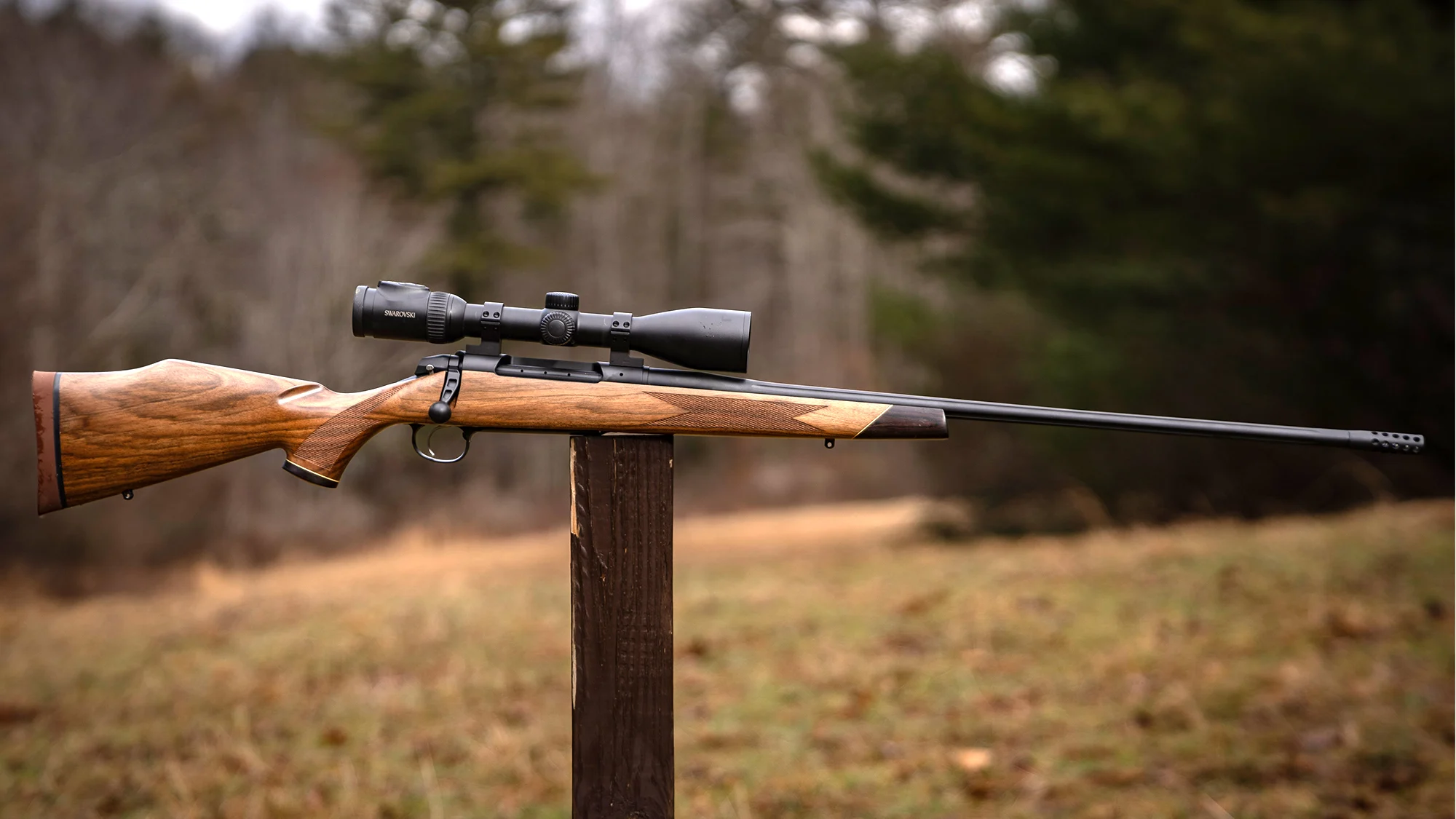
307 Adventure SD Features and Test Results
Pros
Beautiful
Accurate
Well balanced
Cons
Safety does not lock the bolt
Long and heavy
The 307 action is very similar to a Remington 700 action but, like others mentioned here, has important differences. You can disassemble its two-lug bolt without tools, it has a M16-style extractor, and it comes with a user-adjustable Trigger Tech trigger, and a two-position safety. The stock sets the Adventure SD apart from Weatherby’s other Model 307s. It’s crafted from fancy walnut and has a rosewood forend tip and grip cap, and there’s checkering at the wrist and along the forend. The rifle has a hinged floor plate, a thick recoil pad, and Weatherby finishes all the metal surfaces with Graphite Black Cerakote. The rifle is available in 14 different chamberings with barrels ranging in length from 22 to 28 inches. A Weatherby Accubrake muzzle brake is standard, and the Adventure SD comes with Weatherby’s sub-MOA guarantee when using Weatherby factory ammunition.
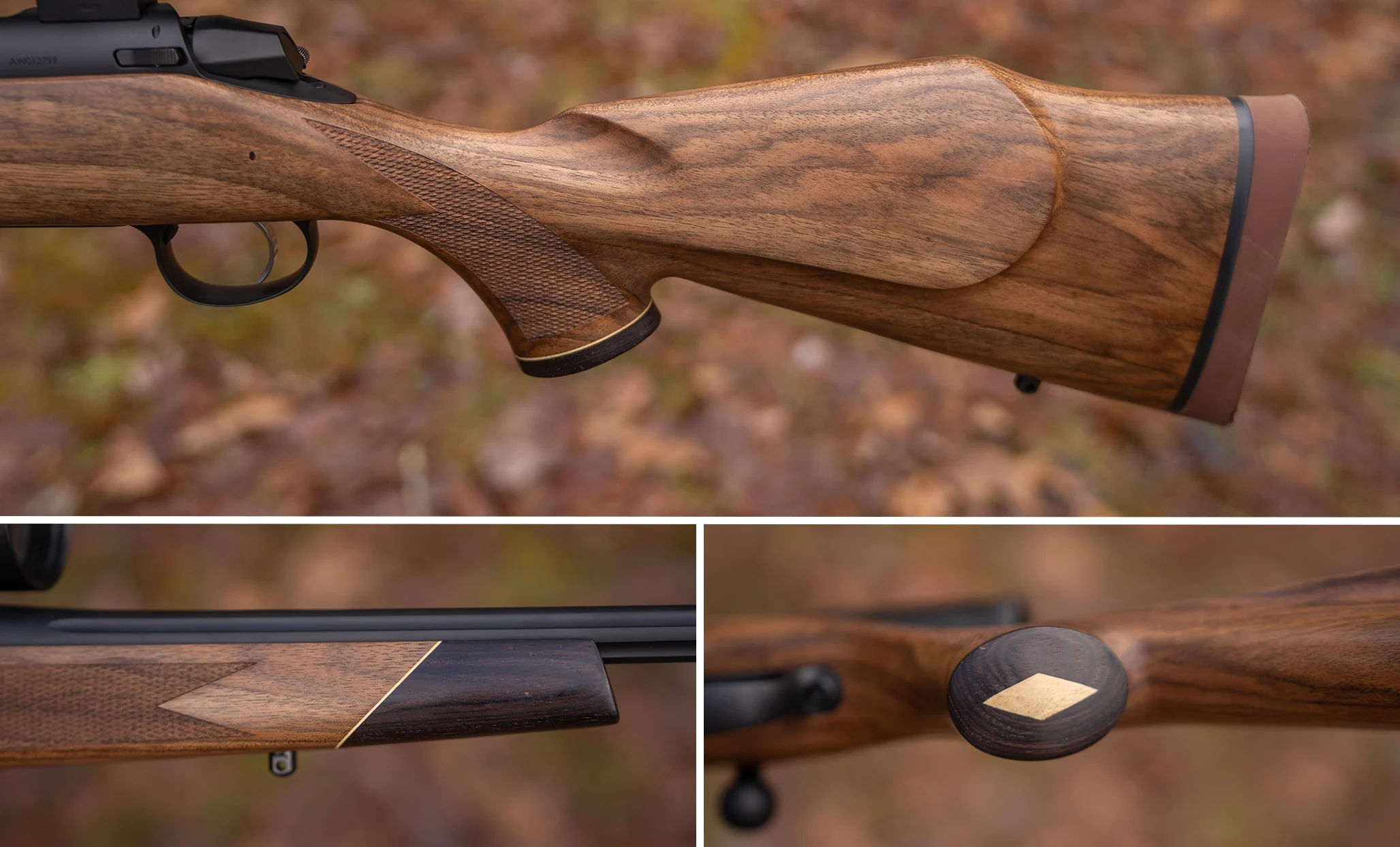
Test Results: The rifle averaged 1.15 inches for six five-shot groups with two different loads, and it would have easily met Weatherby’s three-shot precision guarantee. There were no issues with the rifle during testing; everything worked just as it was supposed to. However, I did not shoot the Adventure SD much with the muzzle brake extensively because it was hellaciously loud. It did do a good job at taming recoil, though. The rifle performed well during off-hand shooting, partly due to its good balance, and partly due to the high comb that provided a good cheek weld and allowed the rifle to glide by my face as it kicked. This is a beautiful and elegant rifle that draws the eye. It does not look like a modern long-range hunting rifle, but it shoots as well as many of them.
Related: Read a full review of the 307 Adventure SD here.
Christensen Arms Evoke
Total Score: 91.26
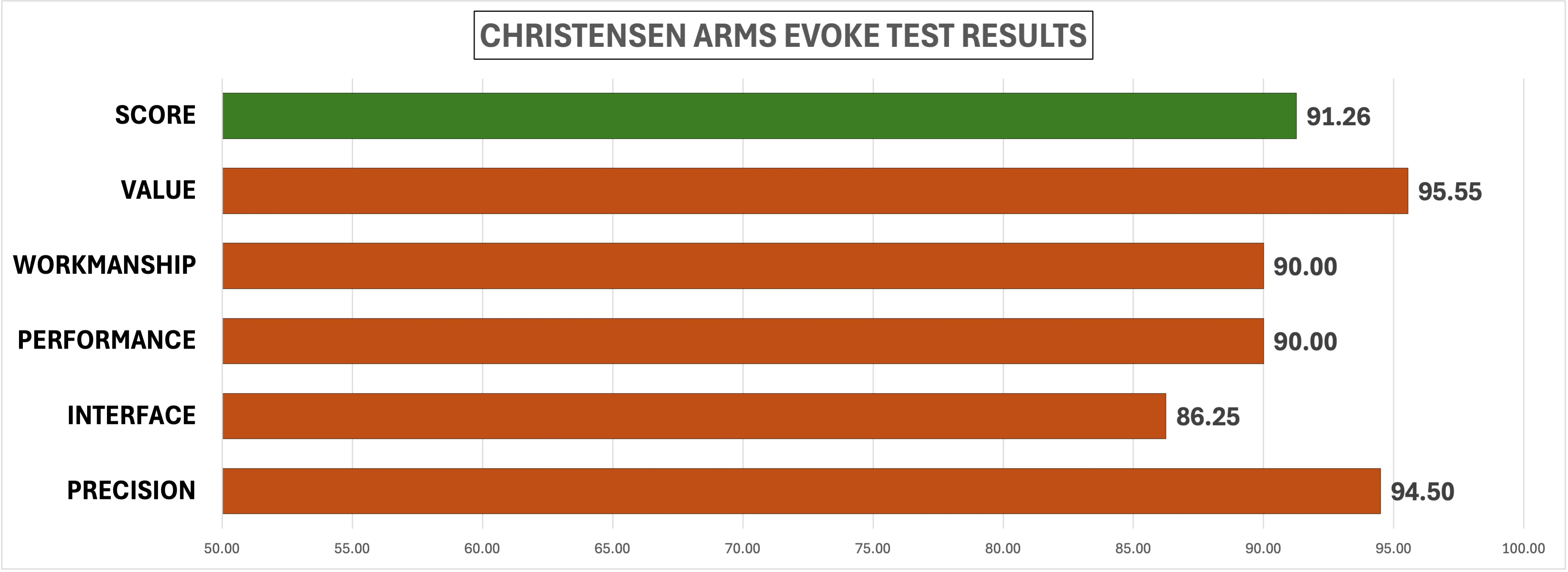

Specs
Length: 42 inches
Weight: 7.69 pounds (as tested)
Barrel: 16.25” to 22” depending on chambering, w/ 5/8x24 threaded muzzle & RFR Brake
Action: Two-lug, 90° bolt action
Trigger: Adjustable Trigger Tech
Capacity: 3+1 Detachable MDT polymer Magazine
Finish: Cerakote
Stock: Synthetic/Polymer
Available Chamberings: 243 Winchester, 6.5 Creedmoor (tested), 6.5 PRC, 270 Winchester, 7mm Remington Magnum, 7mm PRC, 7mm Backcountry, 308 Winchester, 30-06 Springfield, 300 Winchester Magnum, 300 RPC, 350 Legend.
Price: $898.99
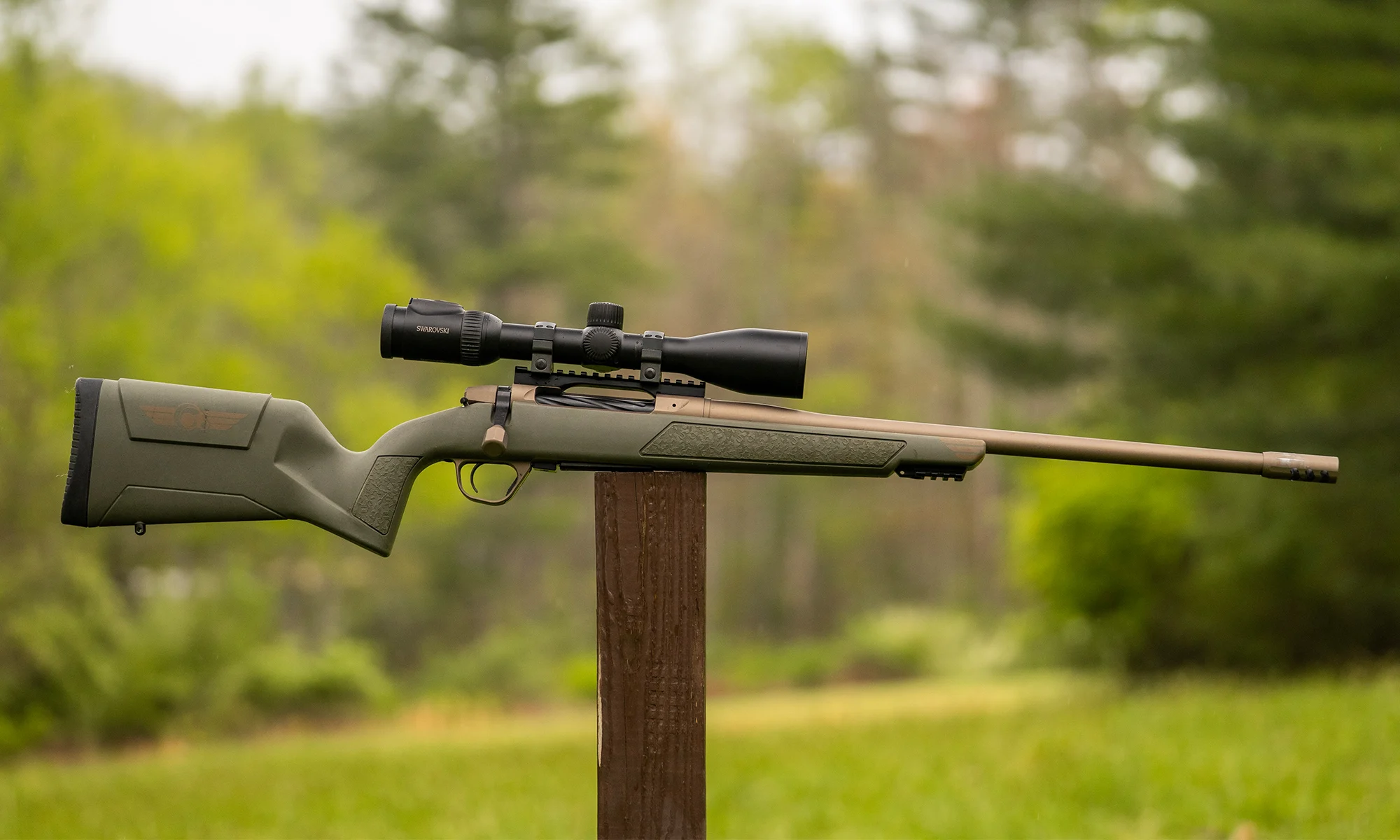
Evoke Features and Test Results
Pros
Integrated Picatinny accessory rail
Comfortable, ergonomic stock
Affordable
Cons
On the heavy side
Safety does not lock bolt
This rifle is built on a new action from Christensen Arms. It has a radially fluted bolt with two lugs and a 90° throw. It also has a plunger ejector and a Sako/M16-style extractor. The action only comes in one length, regardless of the cartridge, and cartridges feed from a detachable MDT magazine with a three-round capacity. The magazine release is on the inside of the trigger guard, and an adjustable Trigger Tech trigger is standard. The Evoke has a threaded, button rifled, hand-lapped, 416R stainless steel barrel, and lengths range from 16.25 to 22 inches and include a RFR stainless-steel muzzle brake. All the metal work is Cerakoted, and the barrel is free floated. The Evoke comes in several stock options, all synthetic, and a variety camo patterns. Every Evoke comes with a short, three-slot, Picatinny rail section at the tip of the forend, and the stocks have comfortable texturing panels at the grip and on the forend. Every Evoke also comes with a three-shot sub-MOA guarantee.

Test Results: At about 7.5 pounds, the Evoke is one of the heaviest rifles tested this year. The only issue with the rifle was with magazine removal. Sometimes I had to fiddle with the magazine a bit to get it out of the rifle. The Evoke did balance well, and even though the magazine was sometimes problematic to remove, cartridges fed from it very smoothly. The texturing on the stock and the Picatinny rail mount for bipod/tripod interface are both very nice, and the Evoke shot well. Meeting the Christensen Arms’ advertised sub-MOA three-shot guarantee with this rifle should not be a problem. I shot the Evoke a good bit with a bipod attached to the rail mount, too, and it remained tight. The Evoke is clearly Christensen Arms entry-level rifle, but it just might be all the rifle some hunters will ever need since it has a limited lifetime guarantee.
Related: Read a full review of the Evoke here.
Savage 110 PPR
Total Score: 91.19
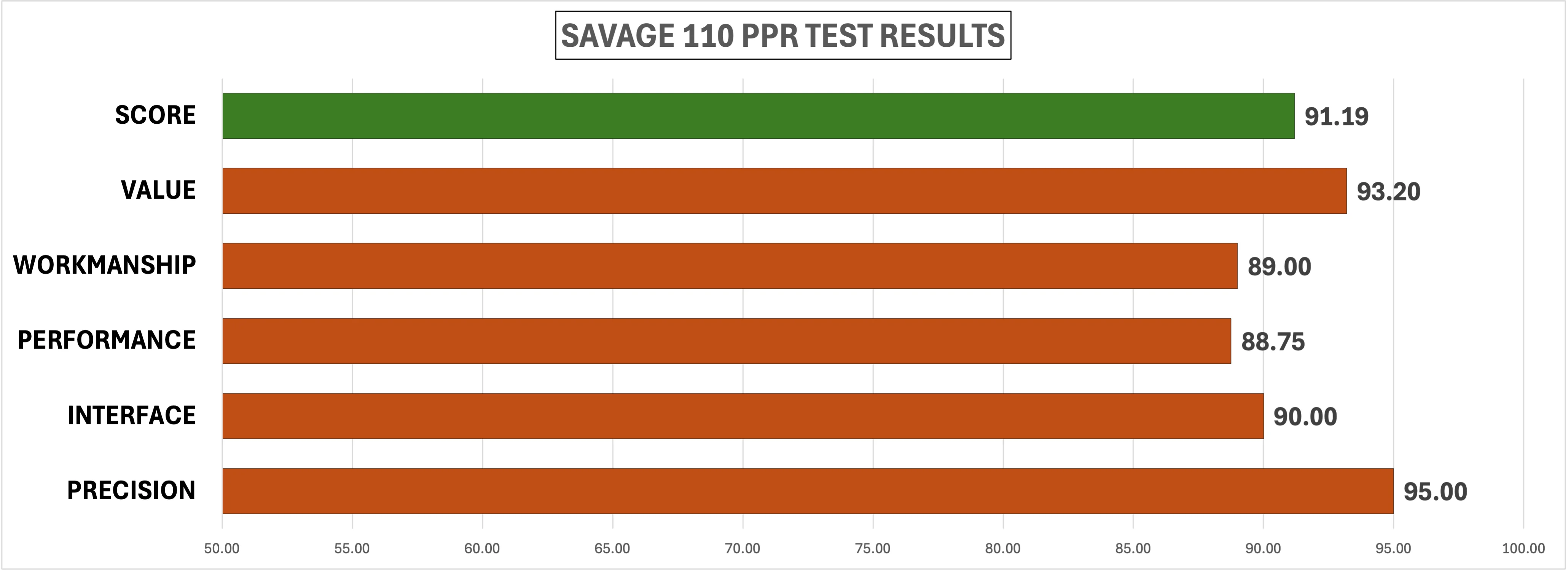

Specs
Length: 41.5 inches
Weight: 7.25 pounds (as tested)
Barrel: 20-inch, Proof Research carbon fiber wrapped stainless steel, threaded at 5/8x24
Action: Model 110 bolt action
Trigger: Savage AccuTrigger (2.75 pounds as tested)
Capacity: 3+1 detachable magazine
Finish: OD green Cerakote
Stock: Greyboe Phoenix 2 with earth-tone camo
Available Chamberings: 6.5 Creedmoor (tested), 6.5 PRC, 270 Winchester, 7mm PRC, 7mm Backcountry, 28 Nosler, 308 Winchester, 300 Winchester Short Magnum, 30-06 Springfield, 300 Winchester Magnum
Price: $2,399
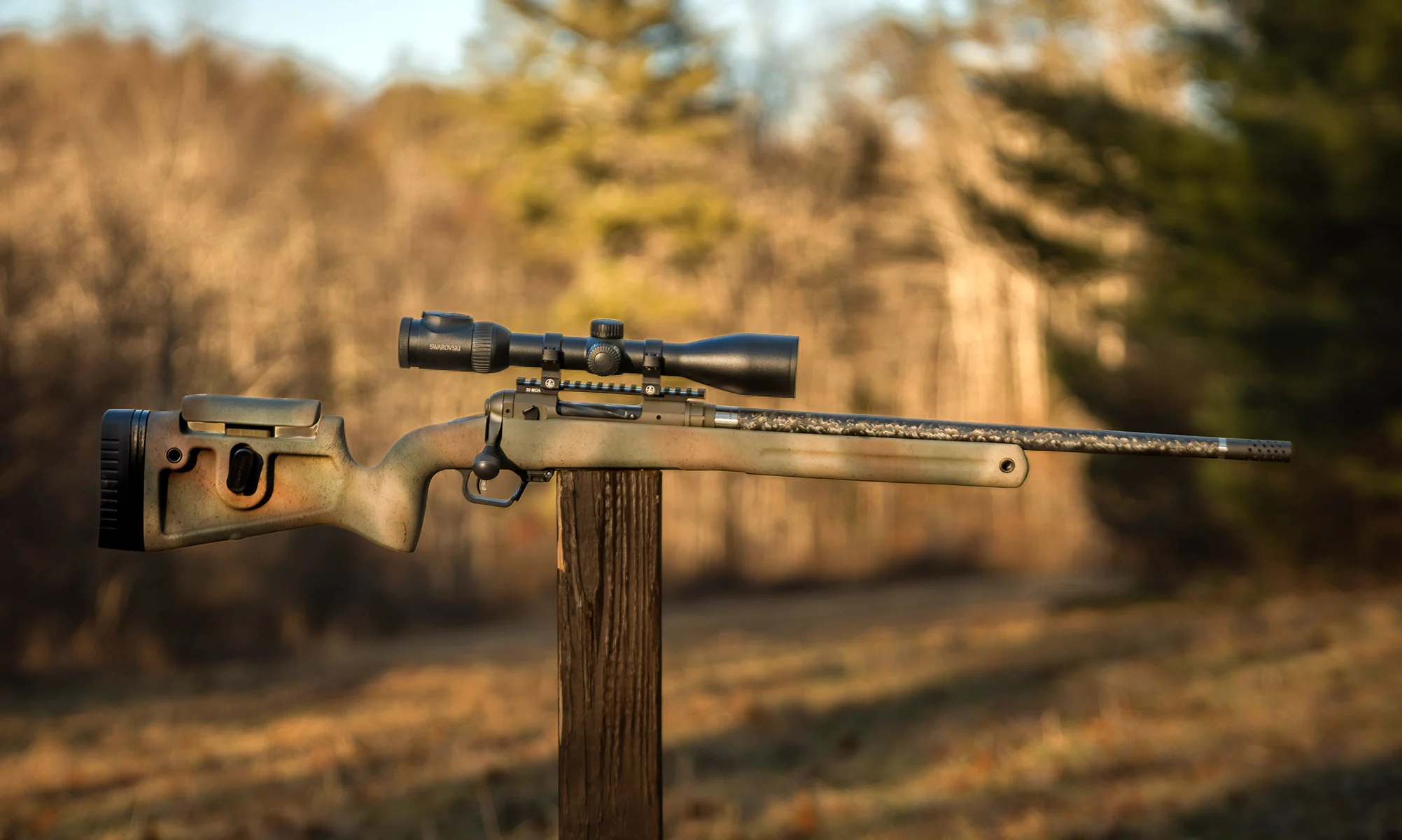
110 PPR Features and Test Results
Pros
Three-position safety
Stock adjustability
Great precision
M-Lok forend
Cons
Rough bolt
Finicky magazine
Savage’s builds the PPR on the Model 110 action, which they also fit with a stainless-steel, 20-inch carbon-fiber-wrapped barrel manufactured by Proof Research. The barrel is threaded at the muzzle, and the rifle comes with an Omniport muzzle brake. The bolt handle is threaded, too, and it has a large round knob that’s knurled around it's circumference. The PPR also has a tang-mounted three-position safety that locks the bolt in the “safe” position. The bolt has two lugs, is radially fluted, and is fitted with two spring-loaded plunger ejectors. The Savage AccuTrigger is standard. The gun wears a Greyboe Phoenix 2 stock that is adjustable for length of pull. You can also adjust comb height, and beneath the forend, there’s a four-slot M-Lok rail. The rifle’s stock has multiple quick-detach sling-swivel cups and is only available in right-handed models.

Test Results: There were two issues with my test rifle. Sometimes, the empty magazine was difficult to remove, and the bolt was semi-stubborn. It wasn’t hard to cycle, just a little rough. Also worth mentioning is the adjustable comb. It was nice, but several times I bumped the large locking knob, loosening it. On the plus side, if you like to use a shooting sling, the numerous QD cups will let you position a sling advantageously. Also, the four-slot M-Lok rail on the underside of the forend allows you to install various bipod/tripod adapters. Overall, Savage’s 110 PPR is a representation of what modern bolt-action hunting rifles have become. It’s a melding of precision-rifle and hunting-rifle features, but at 7.25-pounds, the PPR is a tad on the heavy side. It shot great, but precision does not come cheap. On the other hand, $2,400 is about what you can expect to pay these days for a solid, sub-MOA, suppressor-friendly rifle.
Related: Read a full review of the 110 PPR here.
Weatherby Model 307 Alpine CT
Total Score: 90.89
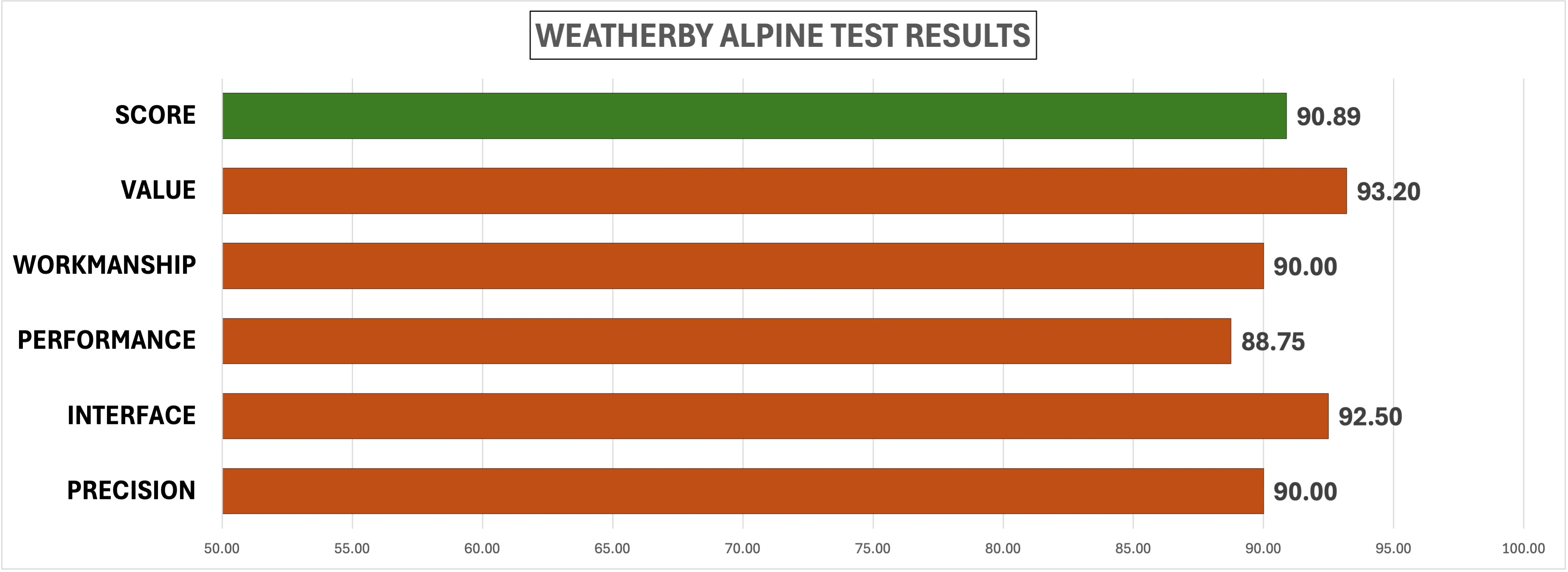

Specs
Length: 43.5 to 48 inches, w/ muzzle brake (43.5 inches as tested)
Weight: 6.0 to 6.3 pounds (6.1 pounds as tested)
Barrel: 22 inches + 2 inches with muzzle brake
Action: Weatherby 307
Trigger: Trigger Tech Field Trigger
Capacity: 2+1, 3+1, or 4+1 depending on chambering (4+1 as tested)
Finish: Chocolate Brown Cerakote
Stock: Exposed carbon fiber with WYO brown and backpack brushed sponge pattern accents.
Available Chamberings: 240 Weatherby Magnum, 243 Winchester, 257 Weatherby Magnum, 6.5 Creedmoor (tested), 6.5 PRC, 6.5-300 Weatherby Magnum, 6.5 Weatherby RPM, 280 Ackley Improved, 7mm Backcountry, 7mm PRC, Winchester, 7mm PRC, 308 Winchester, 300 Winchester Magnum, 300 PRC.
Price: $2,249
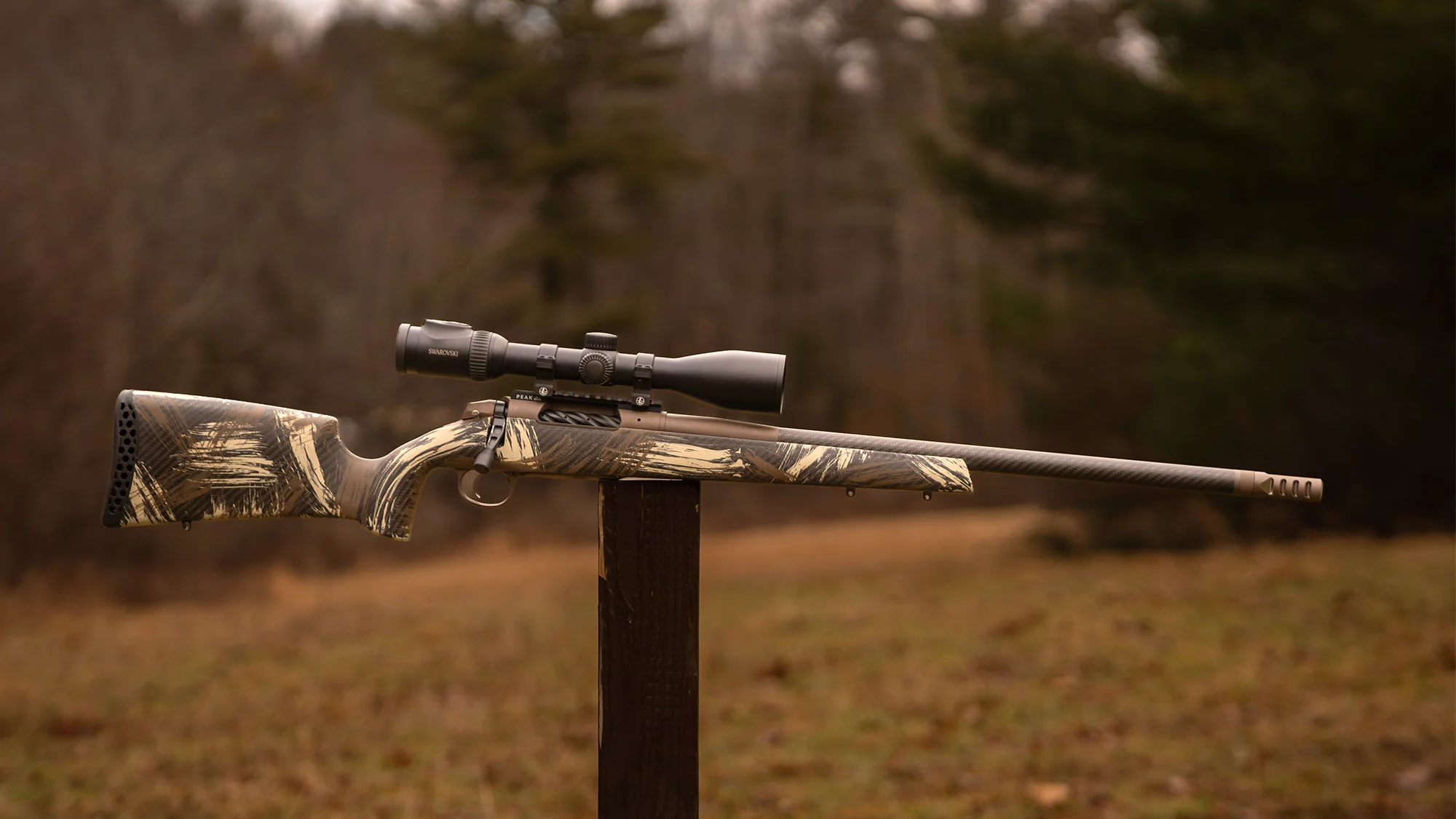
Alpine CT Features and Test Results
Pros
Light
Accurate
Ergonomic stock
Cons
Finicky floor plate
Two-position safety
The Weatherby Alpine CT has a PEAK 44 Bastion stock that only weighs 24 ounces, even with the 3D-Hex recoil pad. The carbon-fiber stock has a high comb with negative drop and a near-vertical pistol grip. The Alpine CT also as has a 416R stainless-steel BSF barrel that’s sleeved with carbon fiber and loaded under tension. Weatherby threads the muzzle, and the rifle comes with a muzzle brake. All exposed metal on the Alpine CT has Graphite Black and Chocolate Brown Cerakote, and a PEAK scope rail is installed at the factory. Barrel lengths will vary from 20 to 26 inches. This rifle is built on Weatherby’s newest, Model 307 action. It has a Remington-700 footprint so it’s compatible with aftermarket Remington 700 parts and accessories. However, this action uses an M16-style extractor, and for scope mounting it uses 8-40 screws. A Trigger Tech trigger and two-position safety are standard.
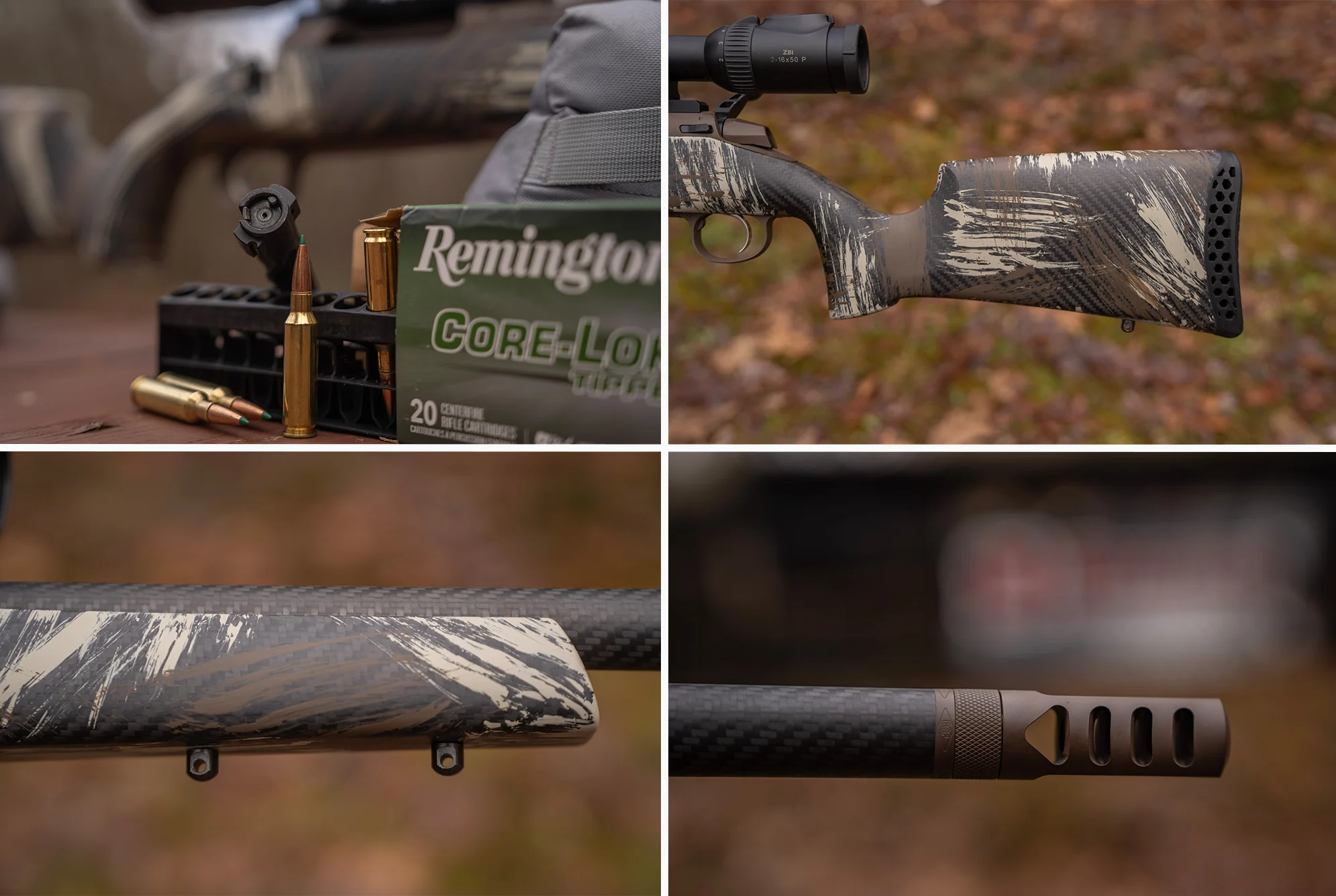
Test Results: All Model 307 Weatherby rifles come with a sub-MOA guarantee. The Alpine CT met that standard with three different big-game capable loads, and with five-shot instead of three-shot groups. If you like muzzle brakes, you’ll like the Accubrake DST brake that comes on the Alpine CT. This is a directional brake that comes with a lock ring for timing. It also has two flats that make removal and installation easy. It works too. Though noise was substantially increased, the brake noticeably reduced felt recoil. I did experience an issue with the floor plate. About half the time—when fully loaded—it would pop open when the rifle was fired. The floor plate latch had a slight hitch in it, and this unexpected opening occurred if you did not take pains to fully engage it. This may have been specific to my test gun, however. All in all, this is a lightweight, accurate, and comfortable-shooting rifle; if you can’t hit with the Alpine CT, it’s your own damned fault.
Related: Read a full review of the Aline CT here.
Marlin 1895 Trapper (Magpul)
Total Score: 90.09
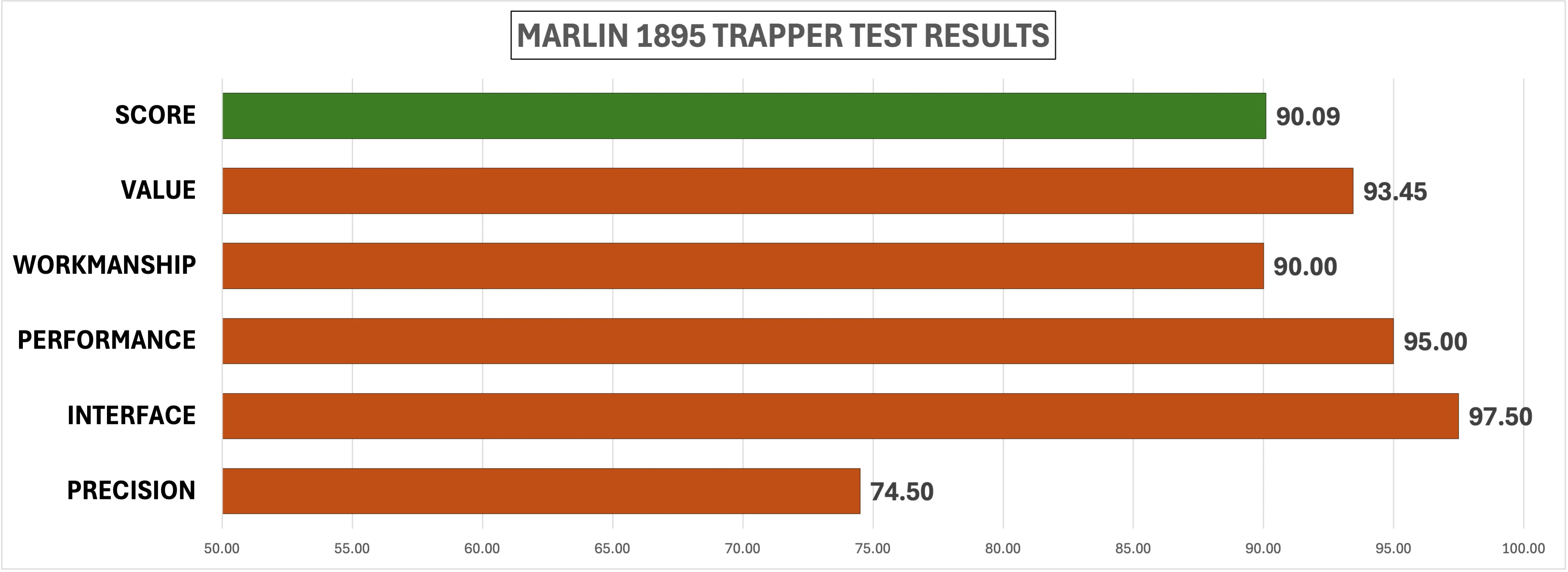

Specs
Length: 33 to 34.5 inches
Weight: 7.0 pounds
Barrel: 16.17 inches, capped and threaded at 11/16x24
Action: Model 1895 lever
Trigger: 5.0 pounds (as tested)
Capacity: 5+1
Finish: Stainless Steel
Stock: Black Magpul ELG buttstock and black ELG M-Lok hand guard.
Available Chamberings: 45-70 Government
Price: $1,649
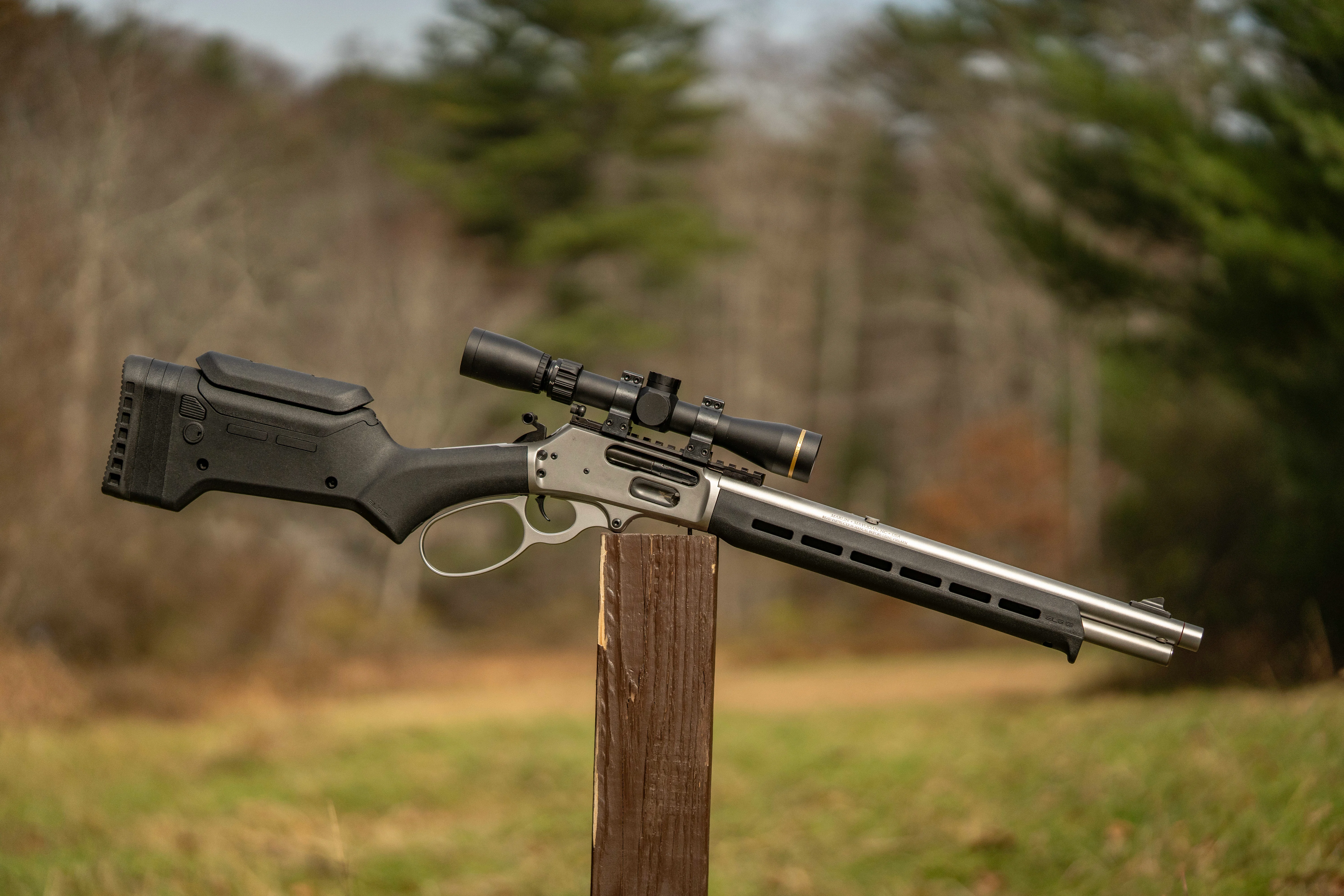
1895 Trapper (Magpul) Features and Test Results
Pros
Compact & handy
Fantastic shooter interface
Reliable
Cons
No front sling-swivel mount
Heavy trigger
This is a stainless-steel lever gun with a 16.17-inch barrel that’s capped and threaded at 11/16x24. It has a proprietary Skinner Sights 10-slot Picatinny rail that includes a fully adjustable peep sight that pairs with a Skinner Bear Buster front sight. The rifle also has an enlarged, stainless lever loop, but the screws, loading gate, hammer, and bolt are black. What really sets this version of the Trapper apart is the Magpul stock. This black polymer stock is adjustable for length of pull and for comb height to work perfectly with the open sights or an optical sight. The stock is also compatible with QD sling mounts. Its most interesting feature is the button-released comb that covers a storage compartment that can hold a six-cartridge quiver. The black polymer forend is also from Magpul, and it has multiple M-Lok slots and is compatible with Magpul rail covers. Unfortunately, there was no forward sling attachment point.
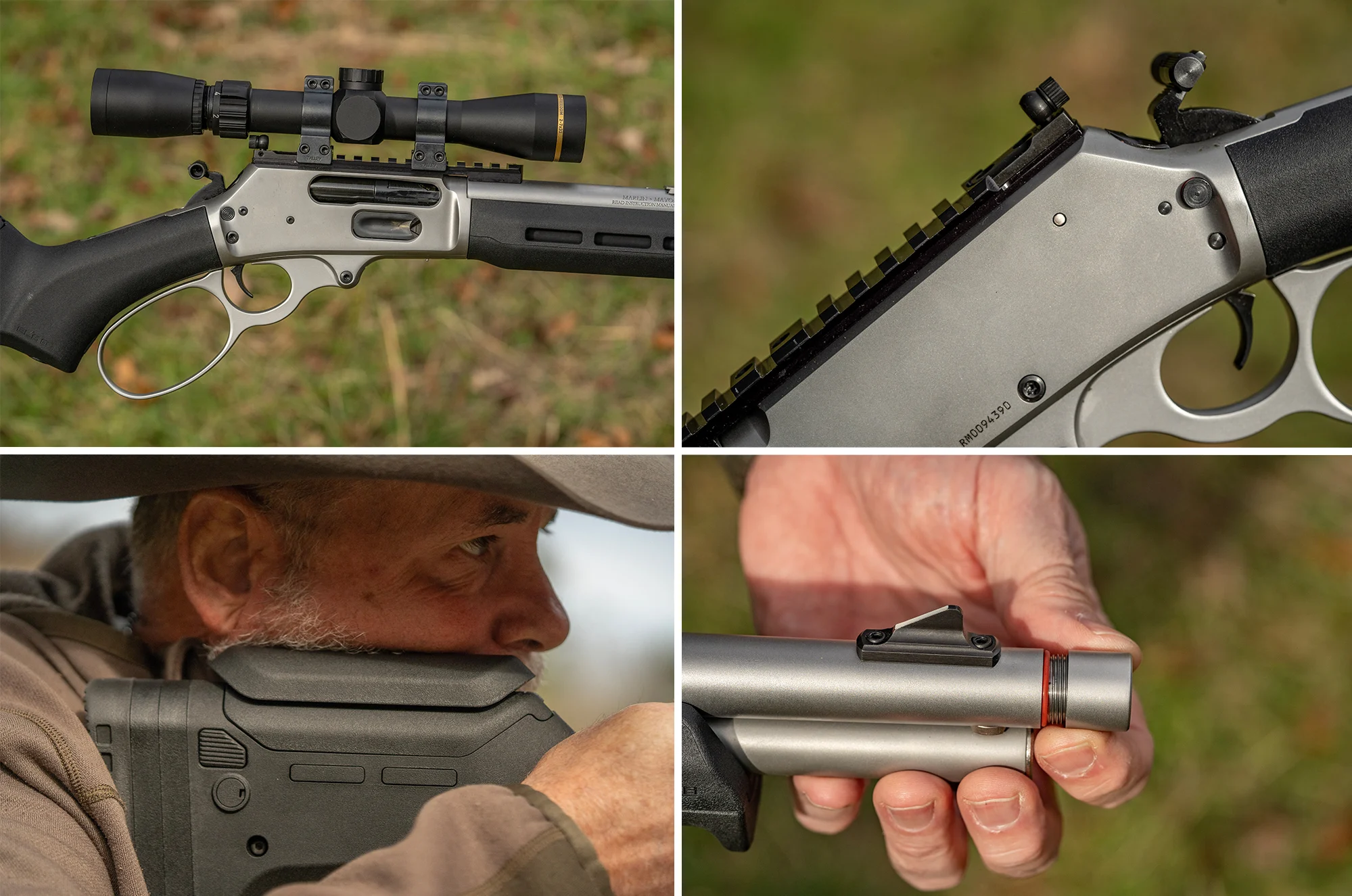
Test Results: From the bench, this Magpul-stocked Trapper shot about the same as the original Trapper we evaluated sometime back. Five-shot groups at 100 yards were in the 2-inch range. With full-power loads, recoil was a bit snappy, but more than tolerable with a suppressor installed. I tested the open sights at 50 yards, and they were dead on. Like most lever guns, this rifle is butt-heavy, but ,of course, that’s why lever guns handle so well, and it's why this rifle performed well when conducting snap shots at a stationary and a moving deer target at 50 yards. My only complaint was the lack of an integral sling mount option on the forend and the not-so-great trigger. You’ll have to purchase an aftermarket M-Lok sling mount accessory, and though the trigger was reasonably crisp, it required 5 pounds of pressure. This rifle is not cheap compared to what lever guns used to cost, but if you can afford it, it’s ready to fight it out with any critter no matter where you’re hunting.
Related: Read of full review of the 1895 Trapper (Magpul) here.
Savage Axis 2 Pro
Total Score: 88.43
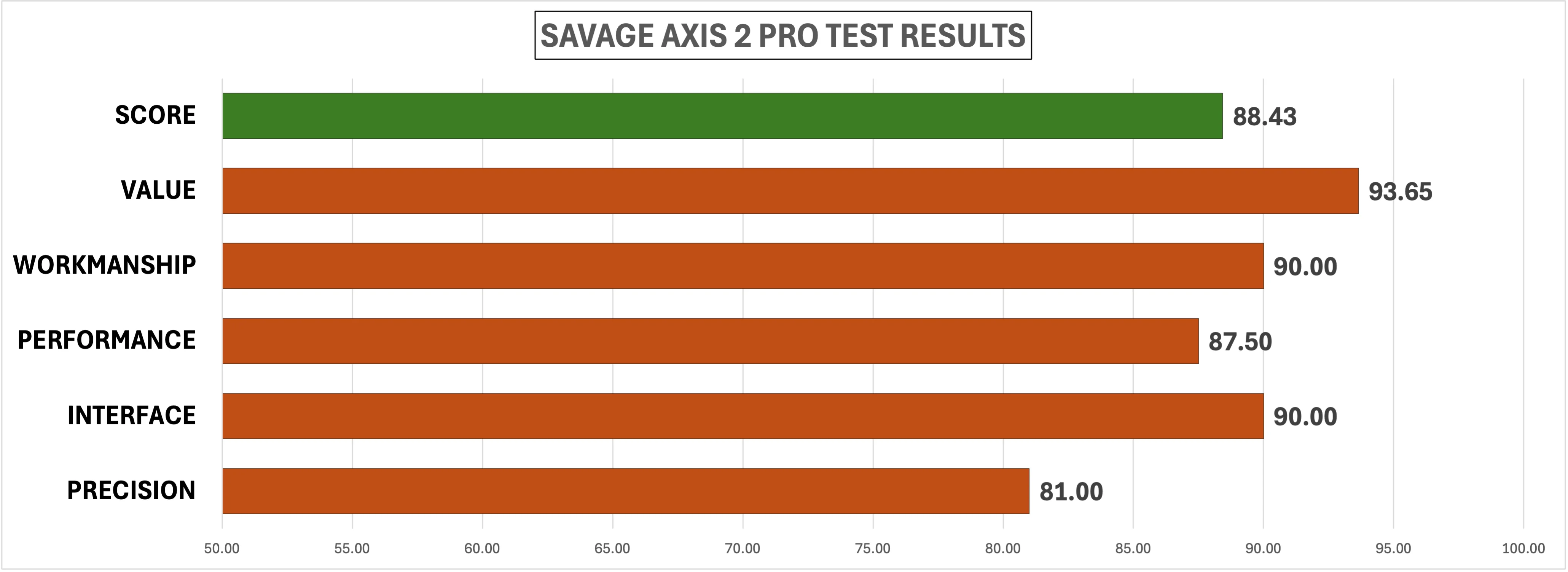

Specs
Length: 38.5 to 40.5 (depending on barrel length)
Weight: 6.90 pounds
Barrel: 20 inches (350 Legend – 18 inches)
Action: Savage Axis II bolt action
Trigger: Savage AccuTrigger
Capacity: 4+1 detachable magazine
Finish: Cerakote
Stock: Polymer with Woodland/Western camo pattern, in right, left, and compact
Available Chamberings: 223 Remington, 22-250 Remington, 243 Winchester, 25-06 Remington, 6.5 Creedmoor (tested), 270 Winchester, 7mm-08 Remington, 308 Winchester, 30-06 Springfield, 350 Legend, 400 Legend
Price: $599 to $639
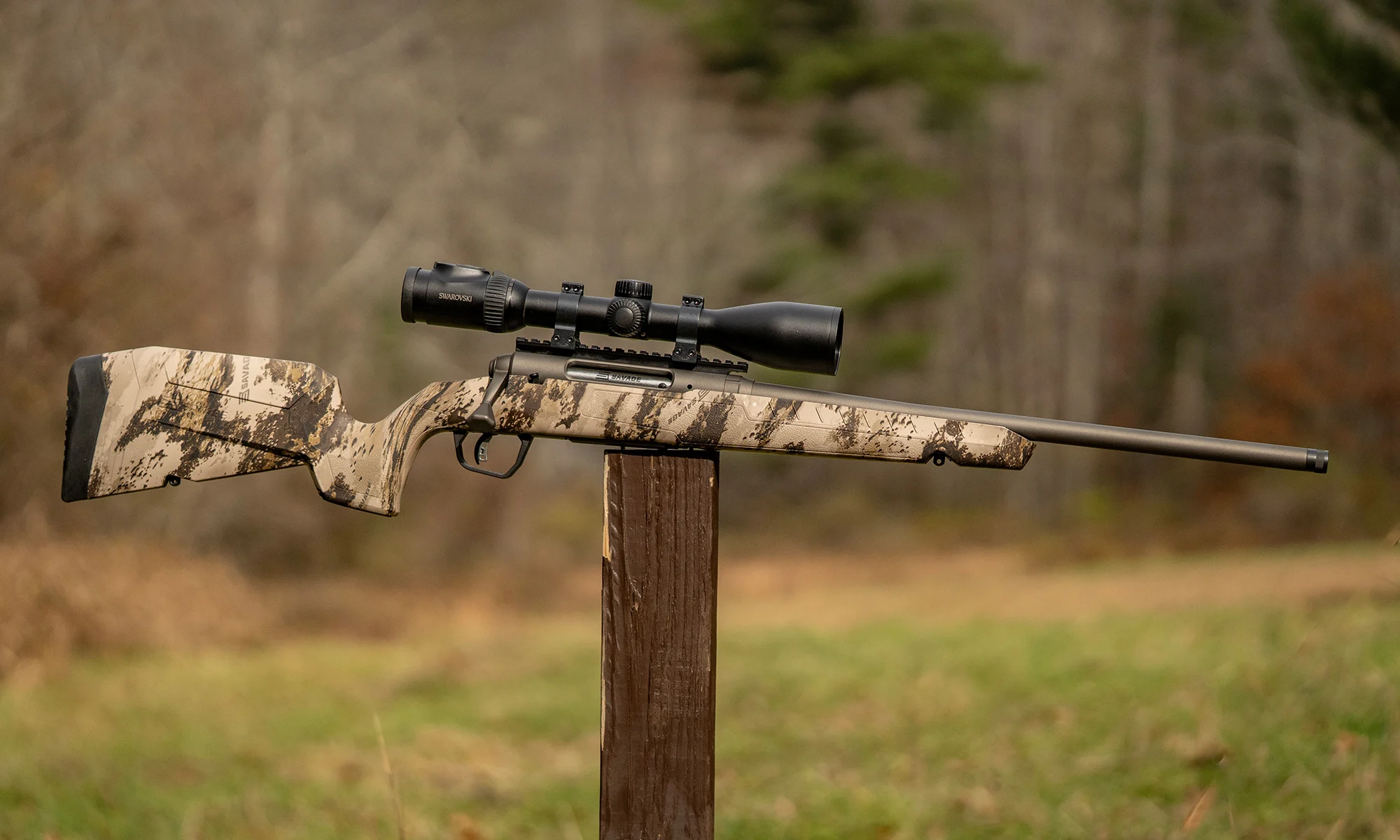
Axis 2 Pro Features and Test Results
Pros
Lots of variations
Suppressor friendly
Good trigger
Good value.
Cons
Stiff bolt operation
Savage machines the Axis 2 Pro’s cylindrical action from raw bar stock, and the rifle comes with a one-piece, 0-MOA scope rail. The rifle has a 20-inch barrel (18 inches in 350 Legend), and Savage threads all the muzzles. Noteworthy enhancements over the Axis rifle include Savage’s popular AccuTrigger and a new stock. The new stock looks like something between a precision-rifle stock and a stock on a more traditional rifle, but it has a near-vertical grip and texture at the grip and forend. It's available with a Woodland, Western, or Forest SP camo patterns, and the metal surfaces have a Gun Metal Bronze Cerakote finish. A detachable, flush-fitting magazine with a push-button release is standard. The Axis 2 Pro also has an elongated, hexagonal bolt handle that’s a bit oversized but very user friendly. Unbelievably, Savage offers more than 50 variations of this rifle, including left-hand and compact models, in 11 different chamberings.

Test Results: This rifle fed, fired, and ejected every time, but it seemed like the geometry of the magazine, feed rails, or follower were slightly off in my 6.5 Creedmoor test gun.. Sometimes there was a bit of a hitch in feeding. Additionally, the bolt lift seemed a tad stiff. Still, the rifle shot well, and the first five-shot group with Federal’s 140-grain Fusion load measured 0.65-inch, and two of the test loads averaged less than an inch. The rifle balanced well, too, even with the short 20-inch barrel. My favorite feature was the hexagonal bolt handle, which seemed perfectly sized for comfortable and fast manipulation. This new Axis 2 rifle incorporates a variety of features currently popular with modern hunters. Though it is an entry level rifle, the Axis 2 Pro performed well beyond its price point, making a very good value.
Related: Read a full review of the Axis 2 Pro here.
Why Trust Us
For more than 125 years, Field & Stream has been providing readers with honest and authentic coverage of outdoor gear. Our writers and editors eat, sleep, and breathe the outdoors, and that passion comes through in our product reviews. You can count on F&S to keep you up to date on the best new gear. And when we write about a product—whether it’s a bass lure or a backpack—we cover the good and the bad, so you know exactly what to expect before you decide to make a purchase.

